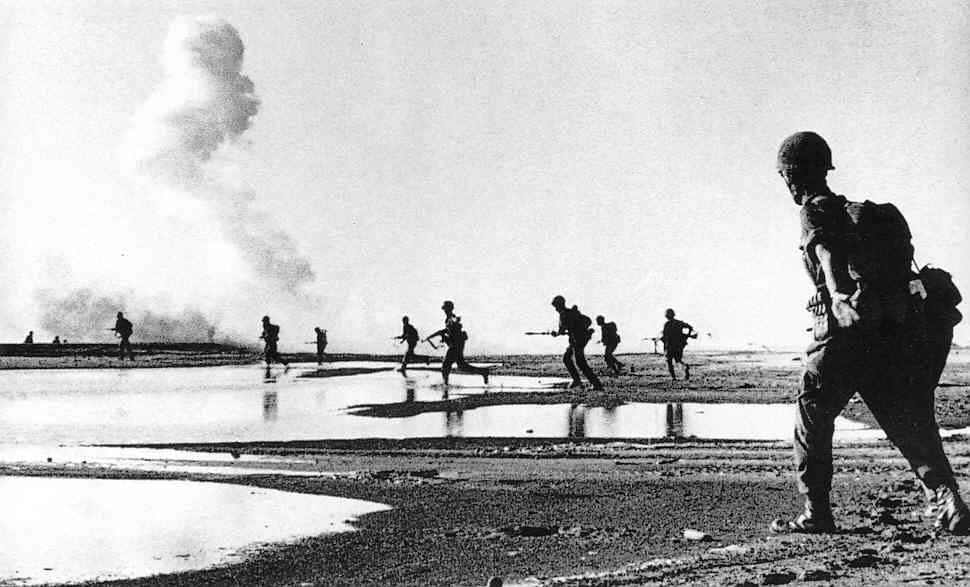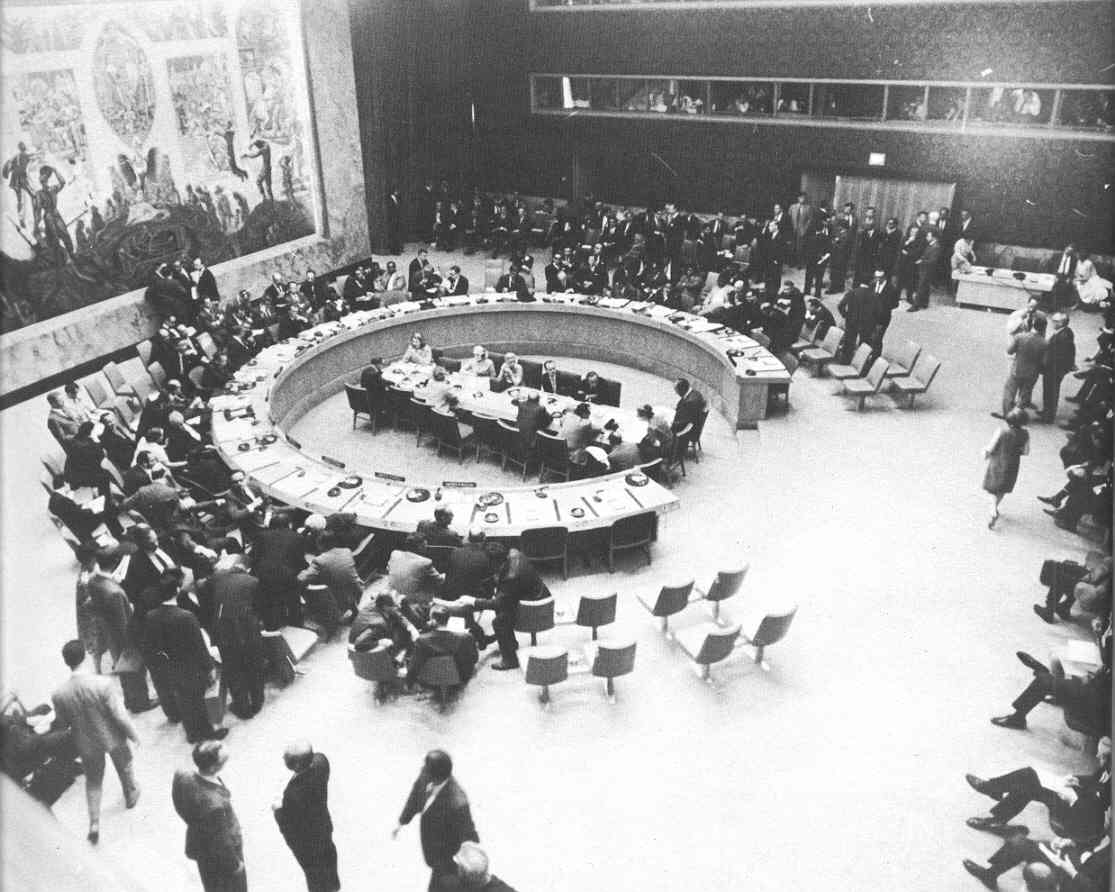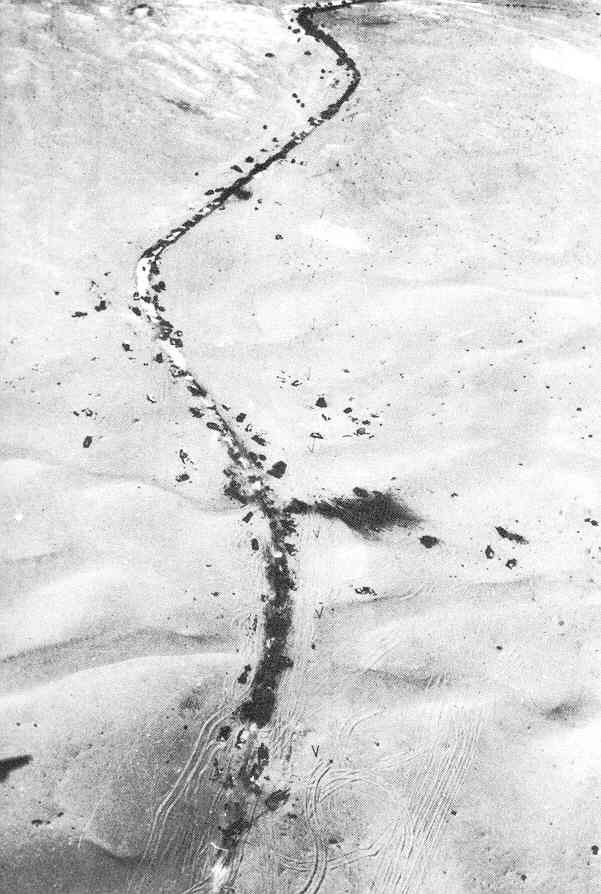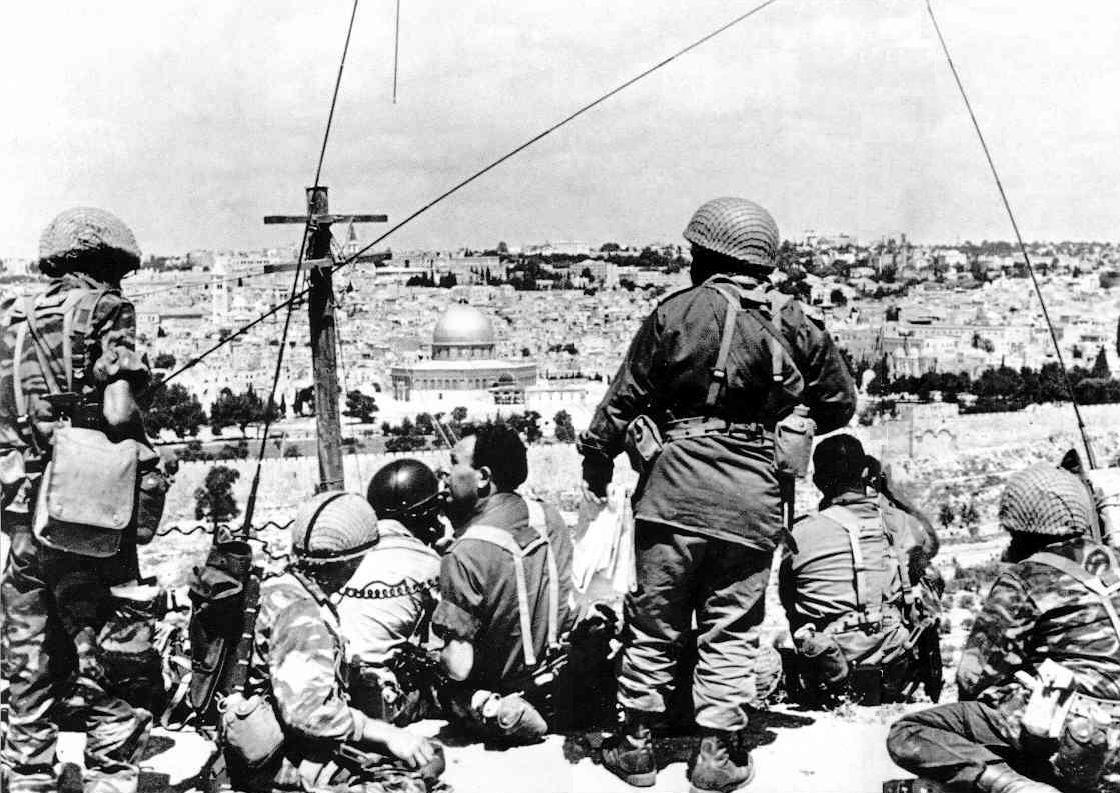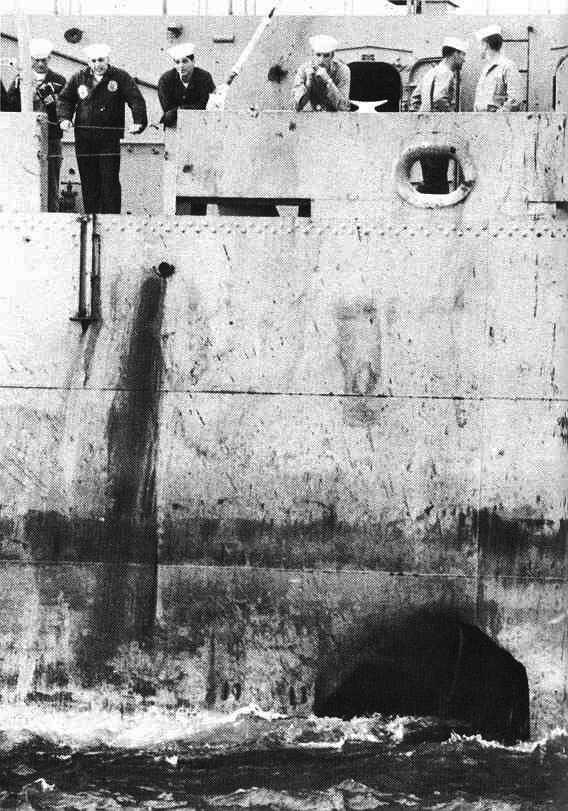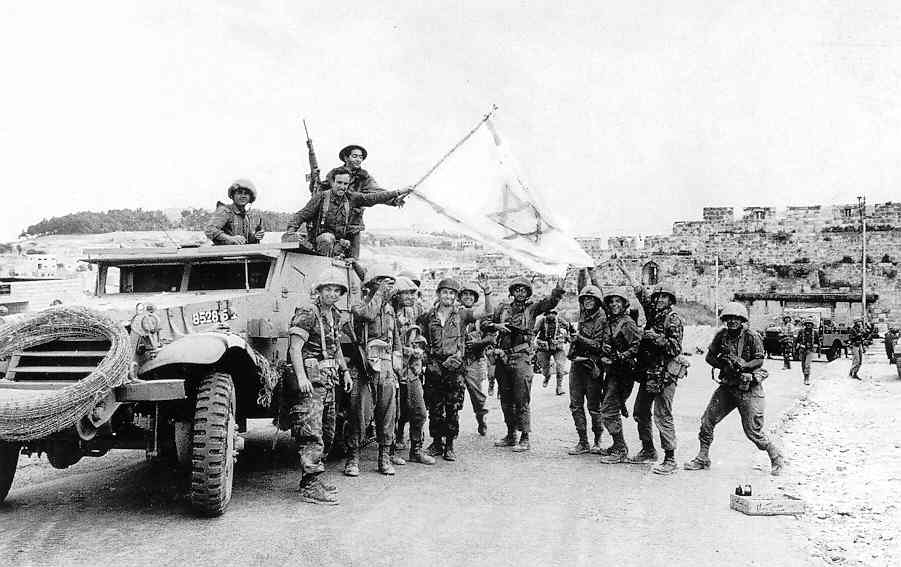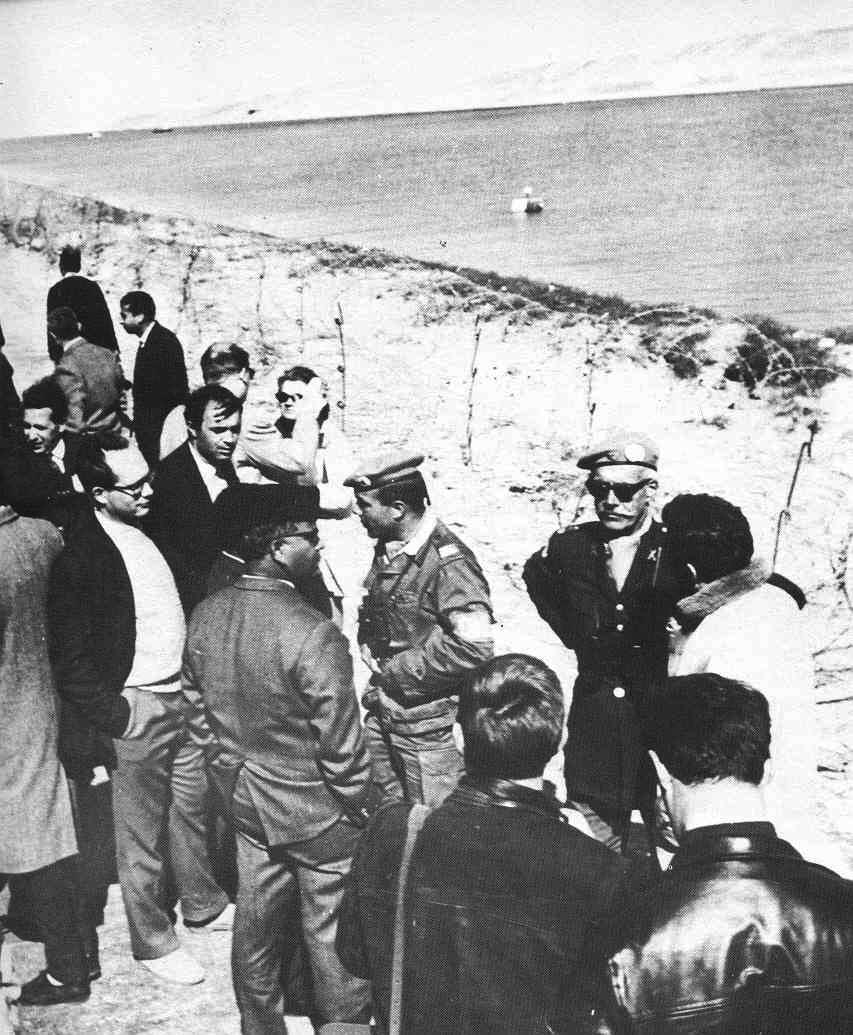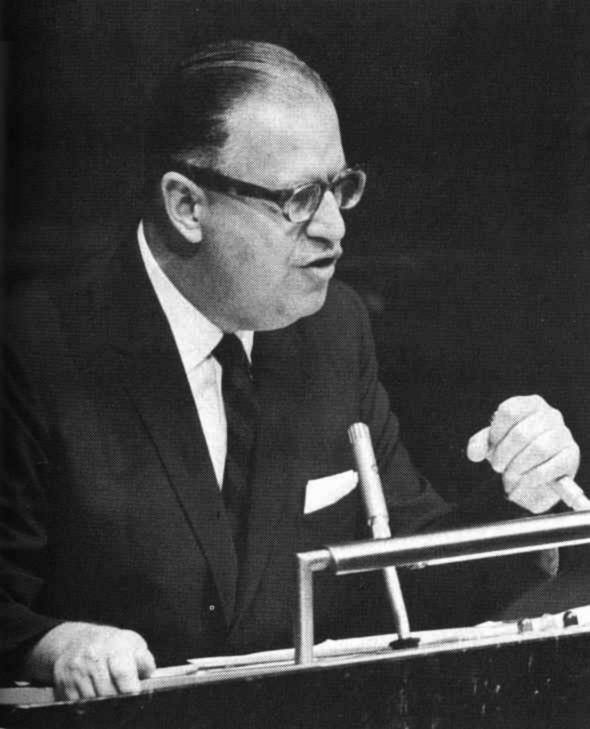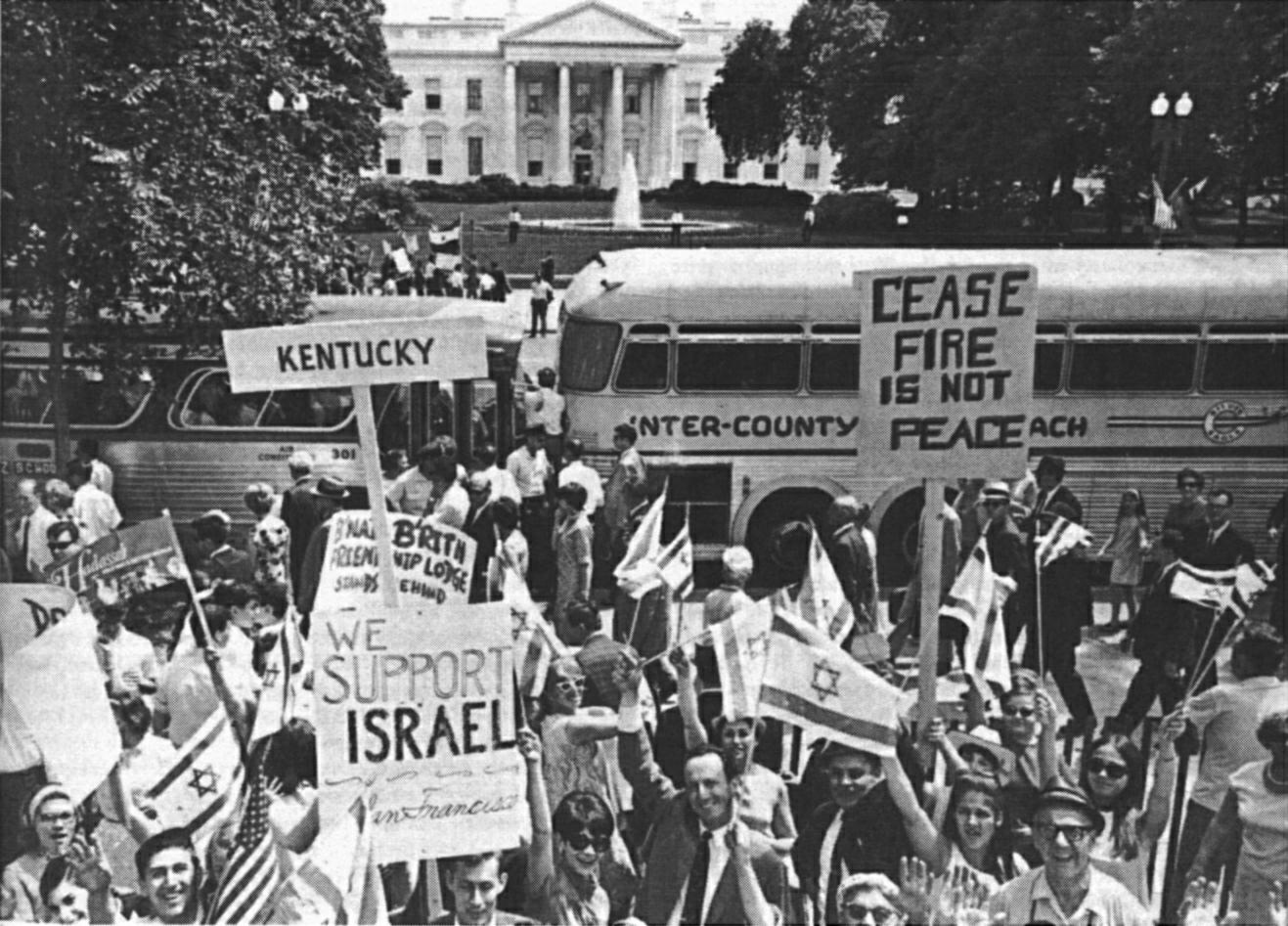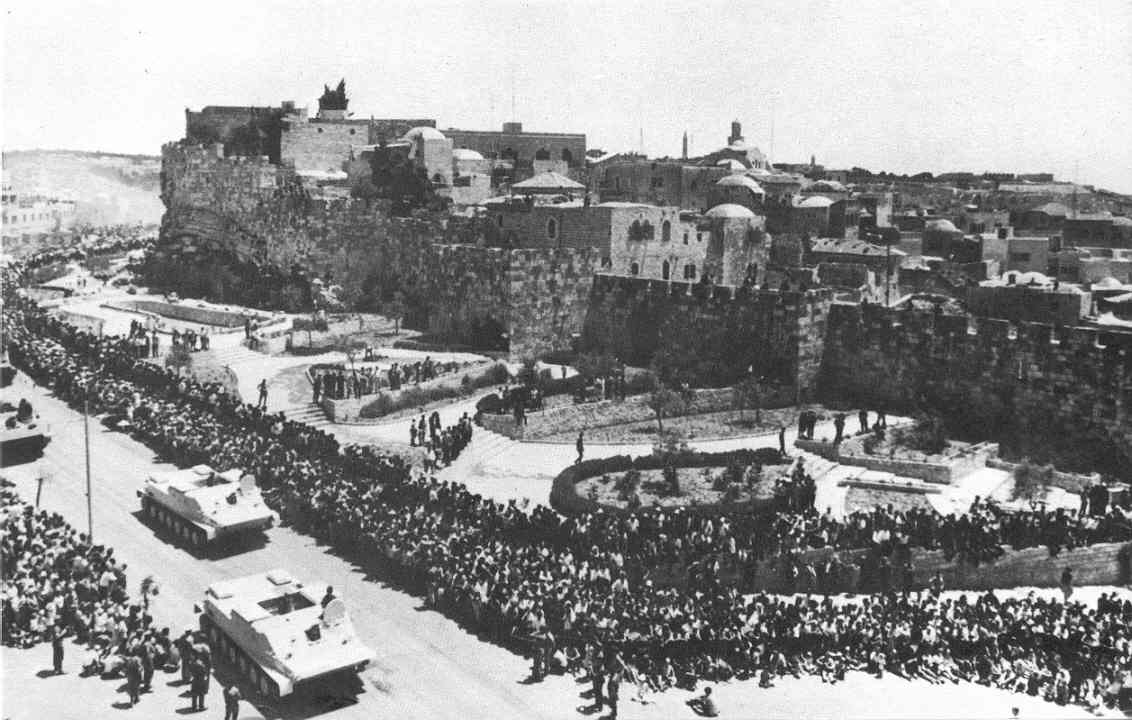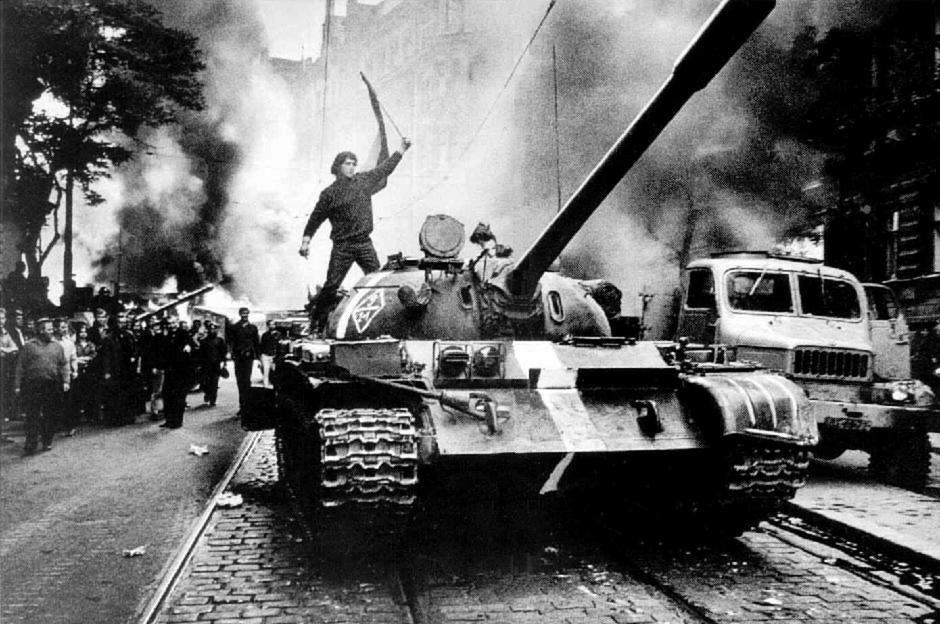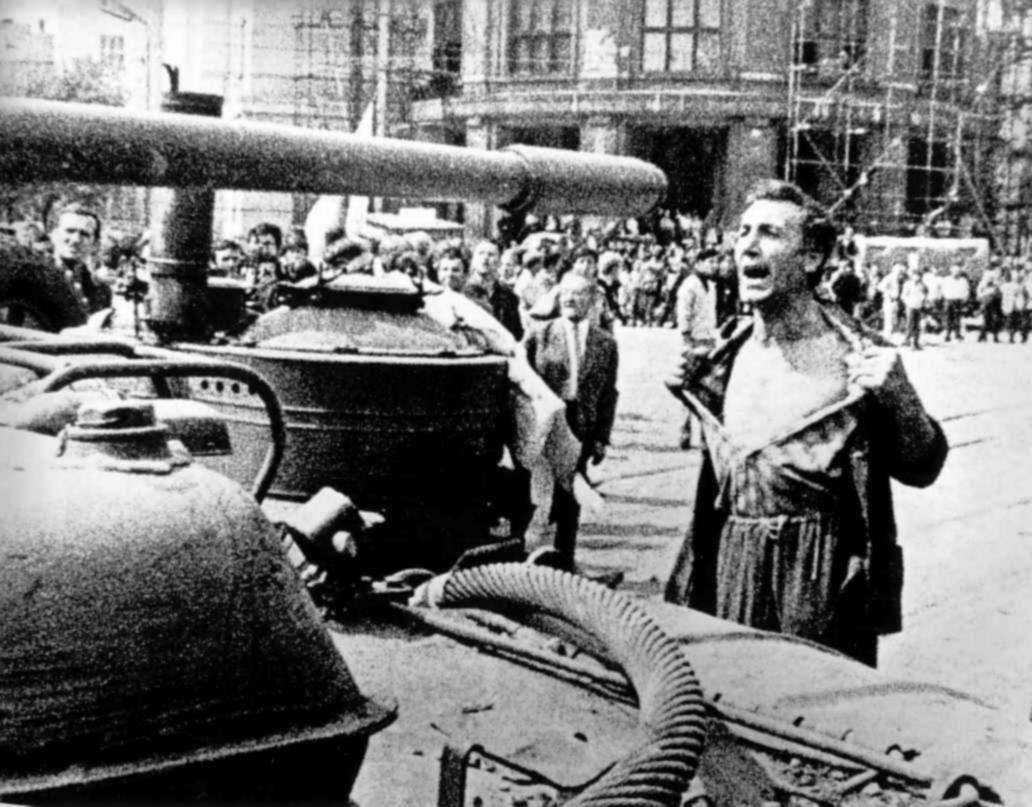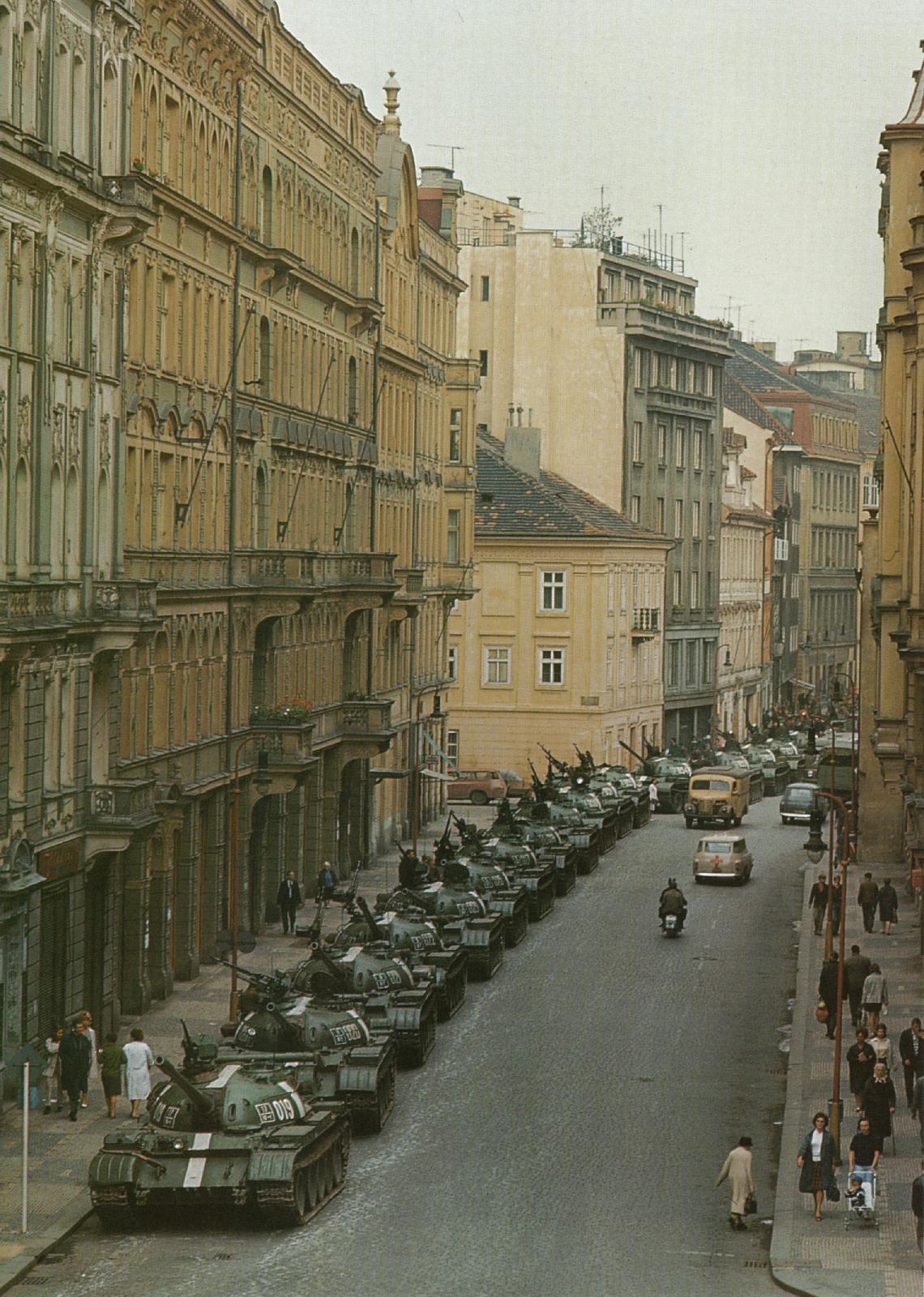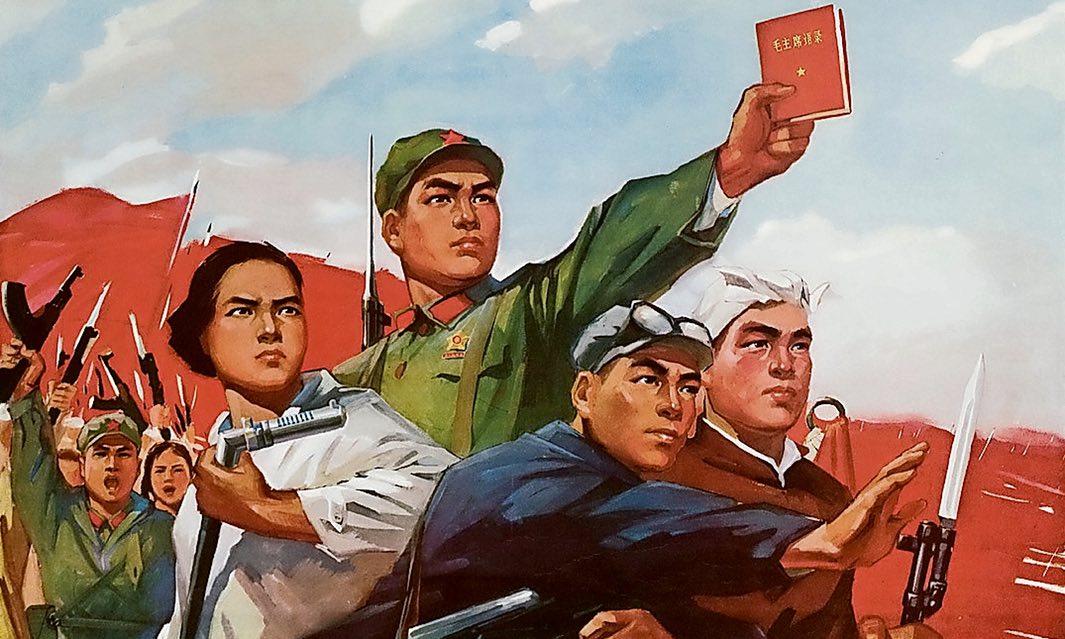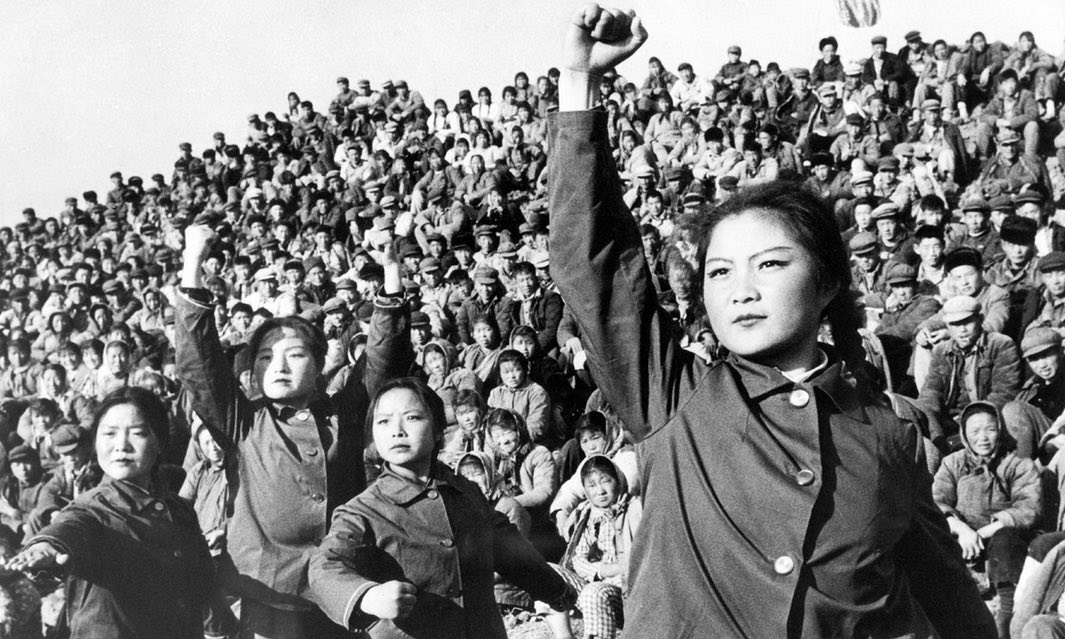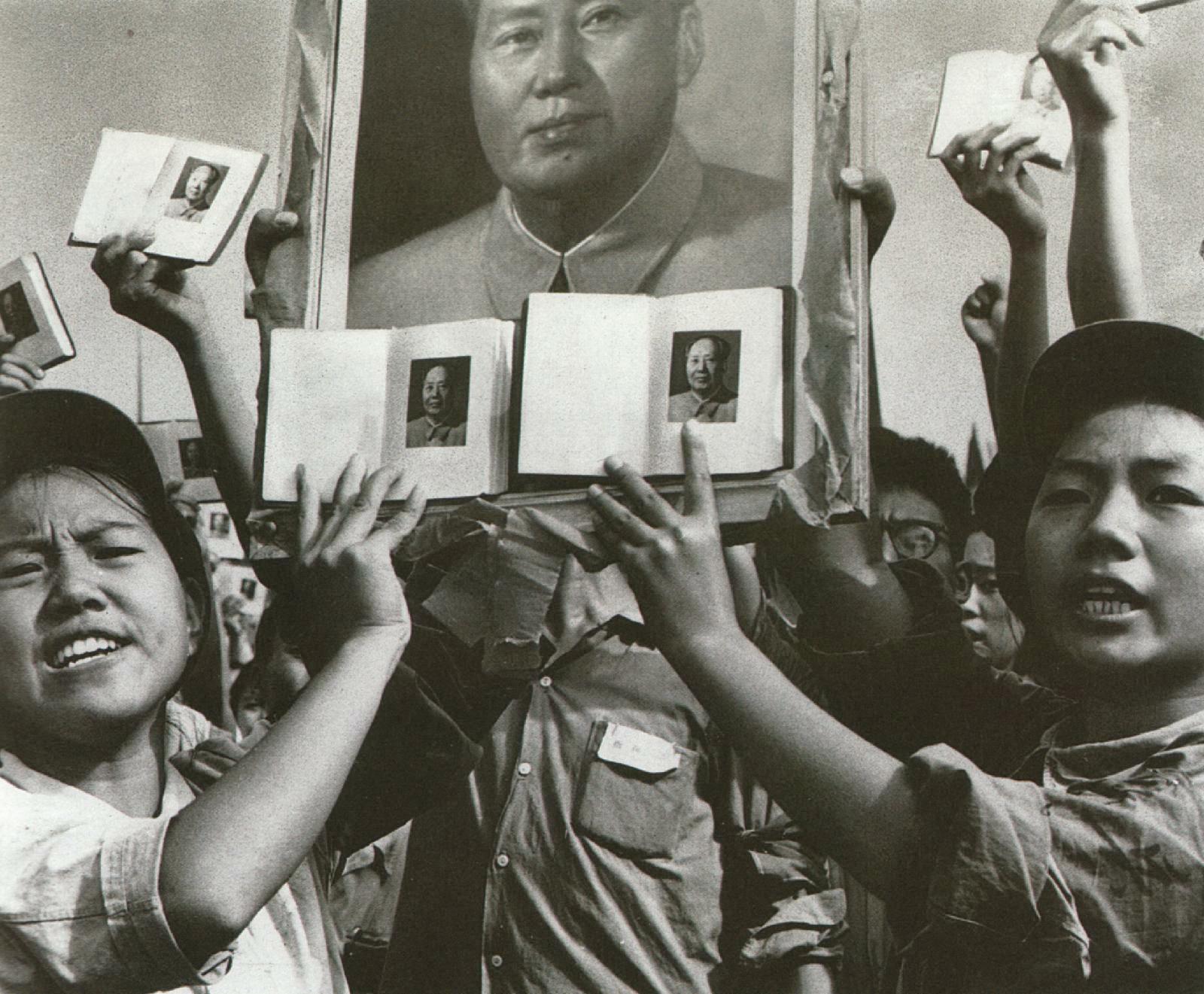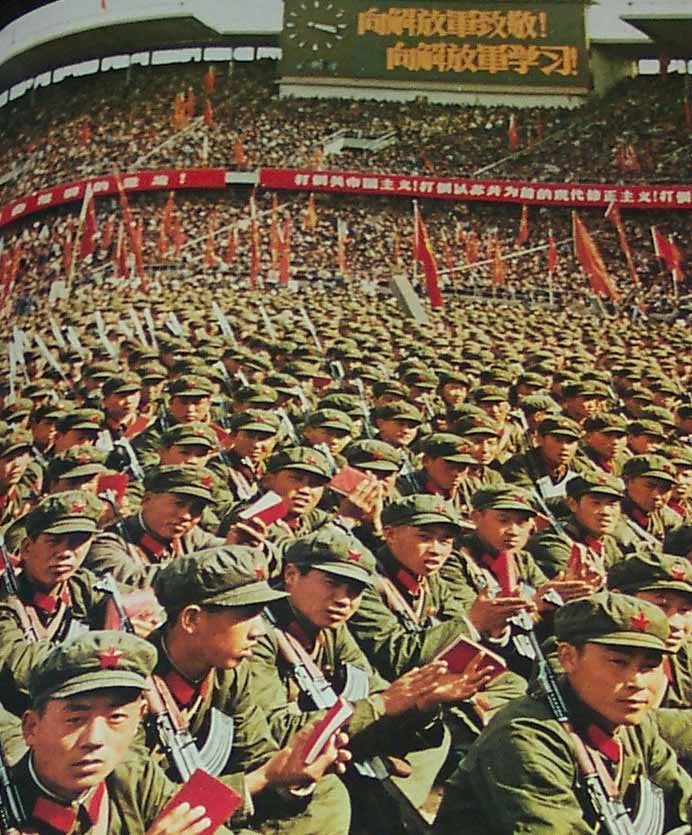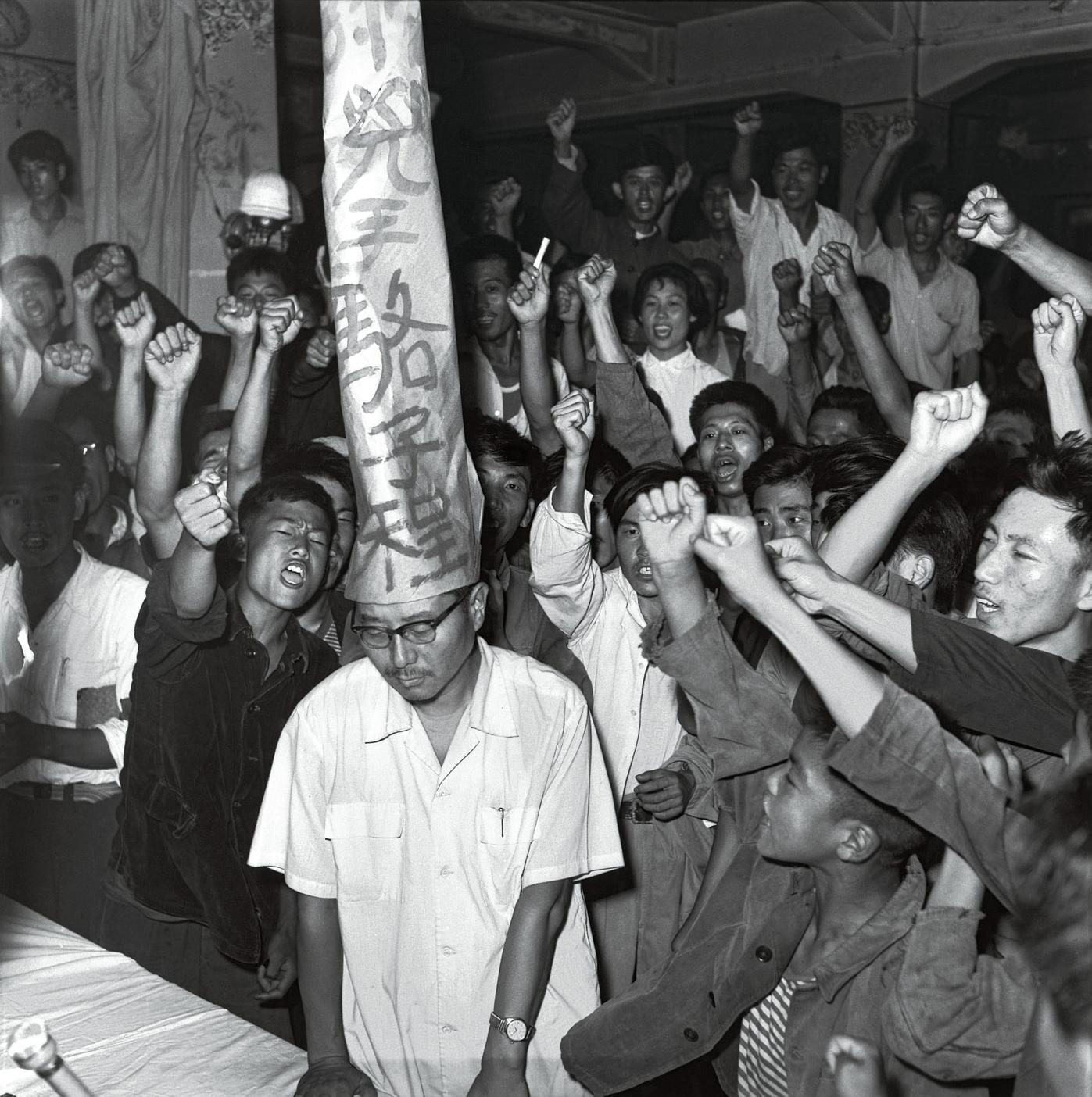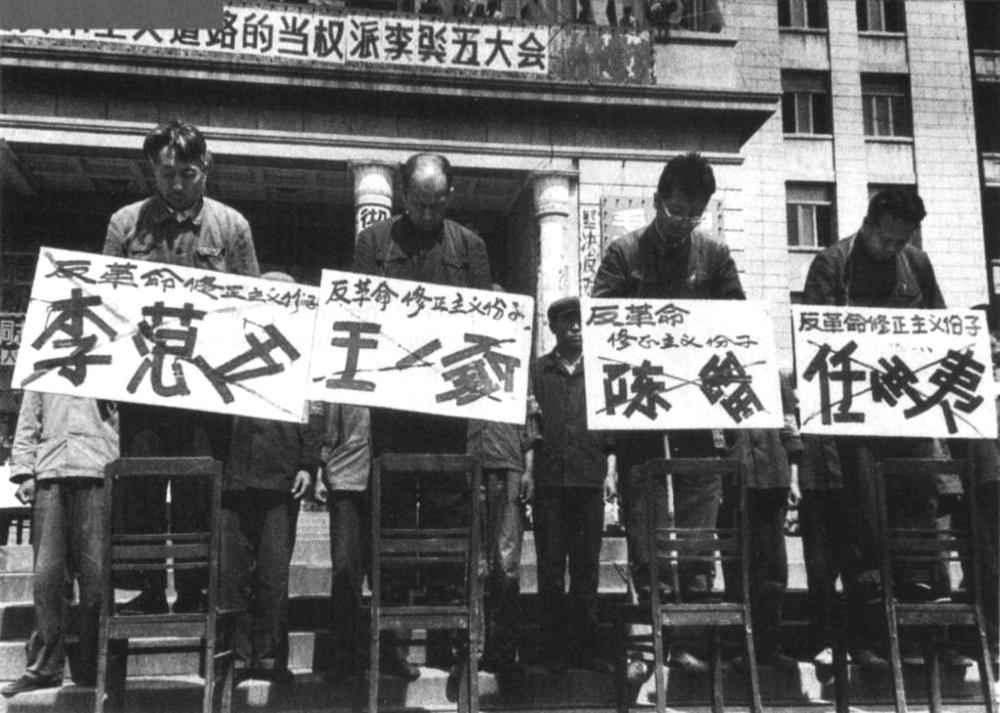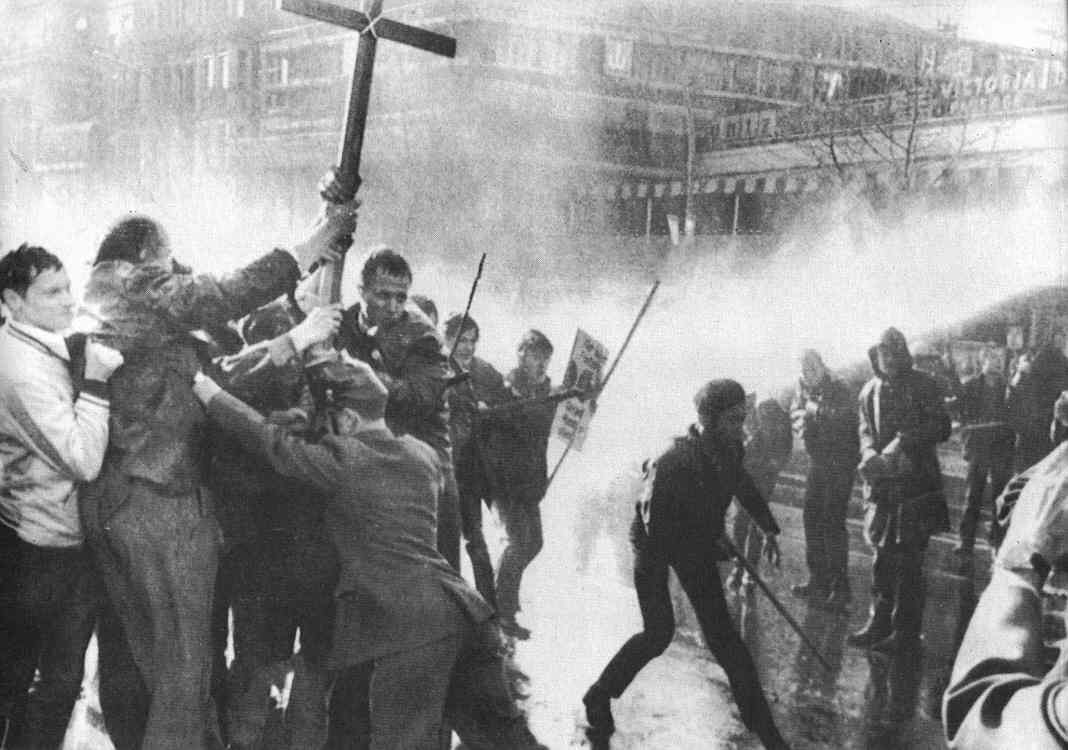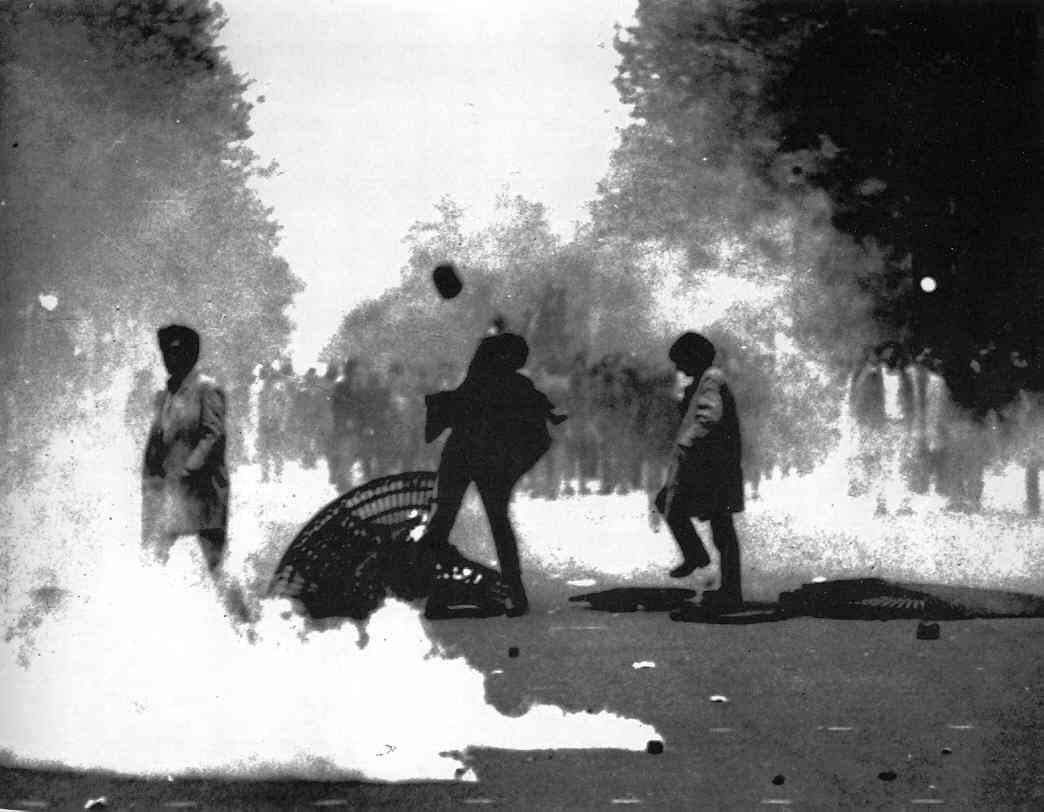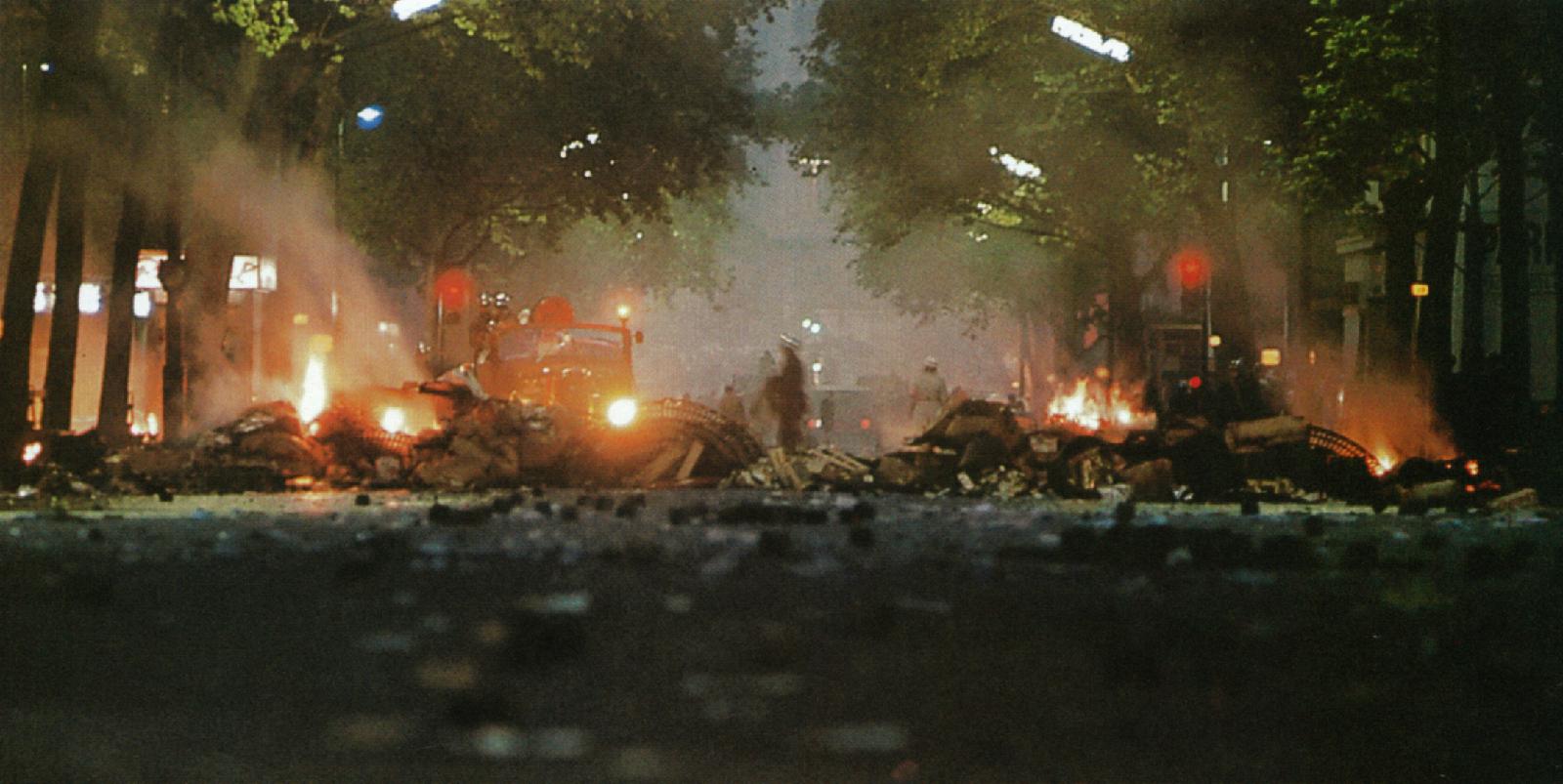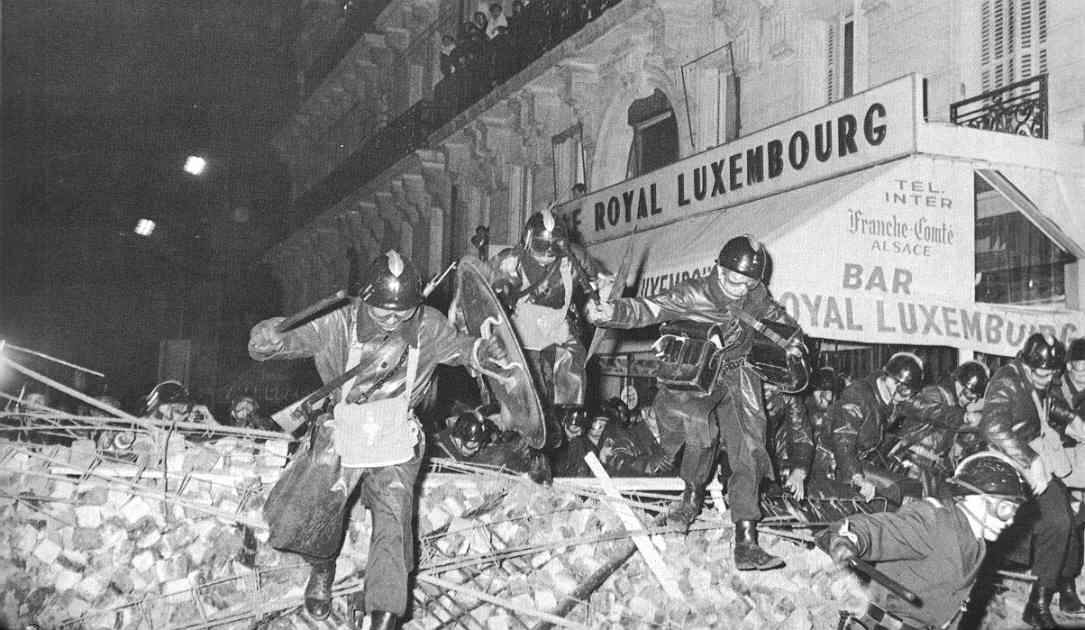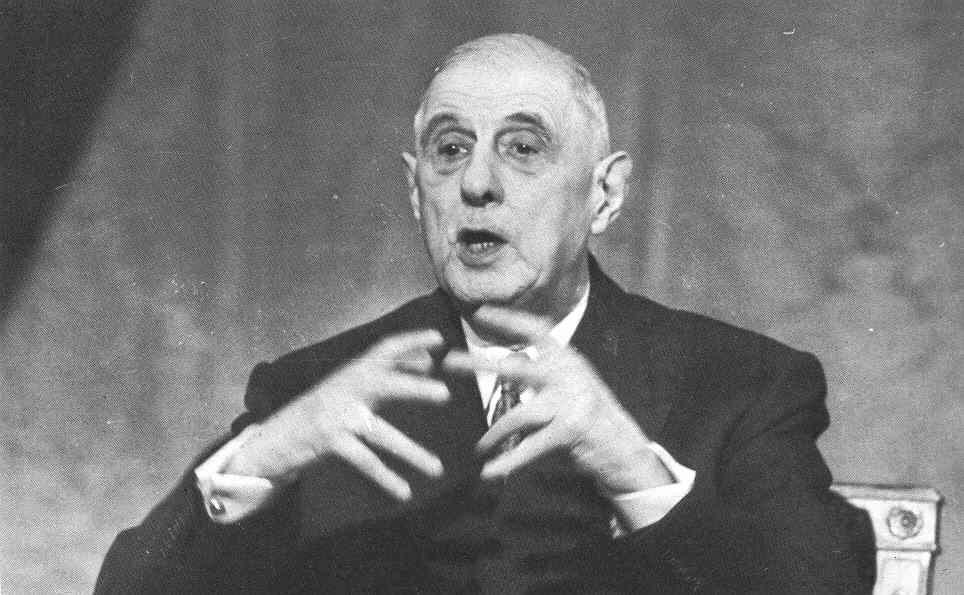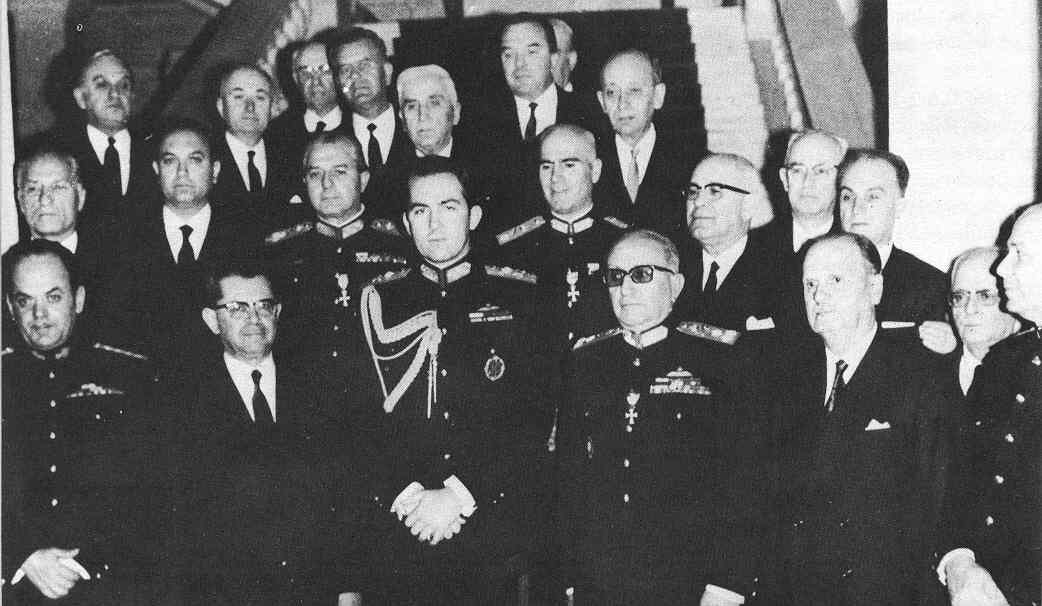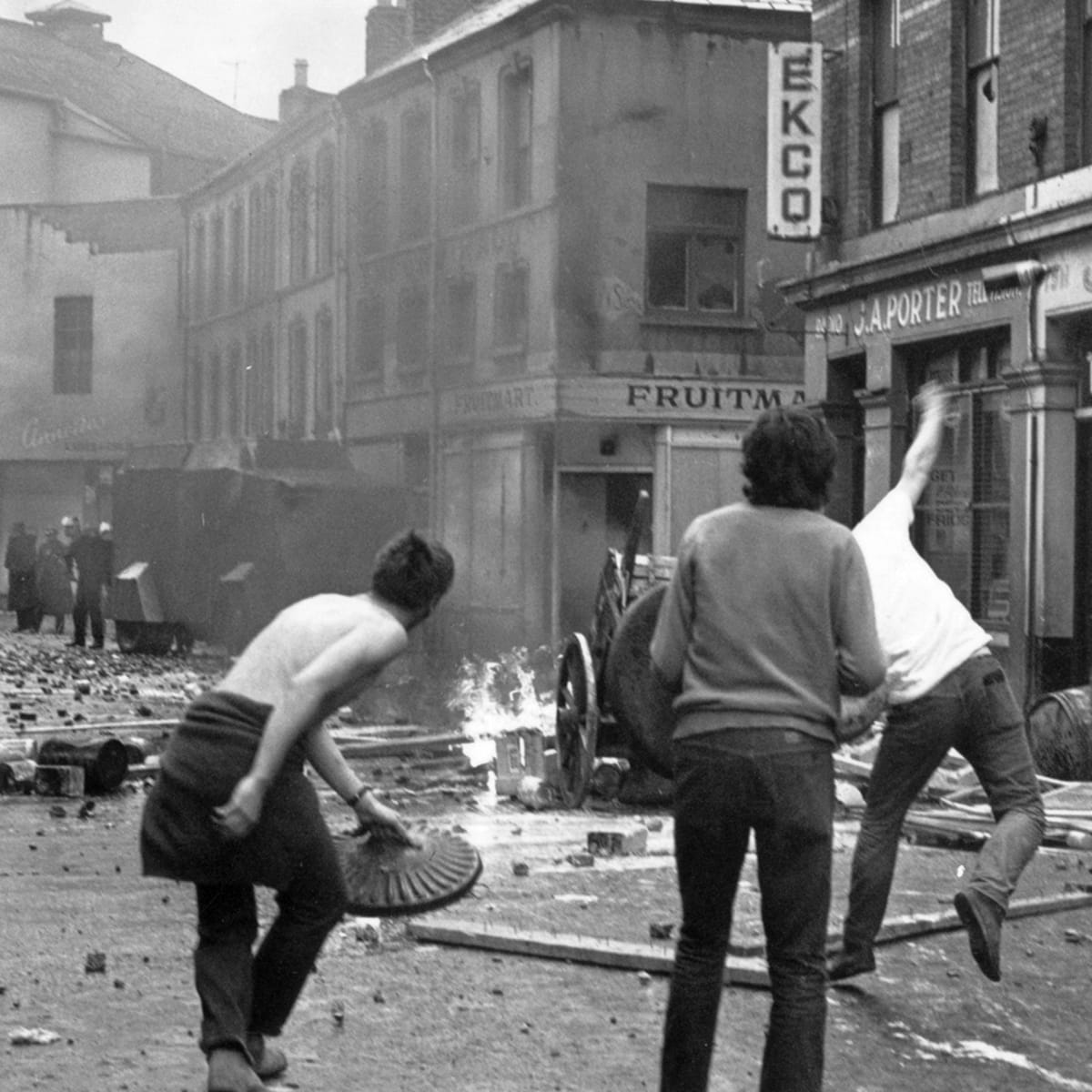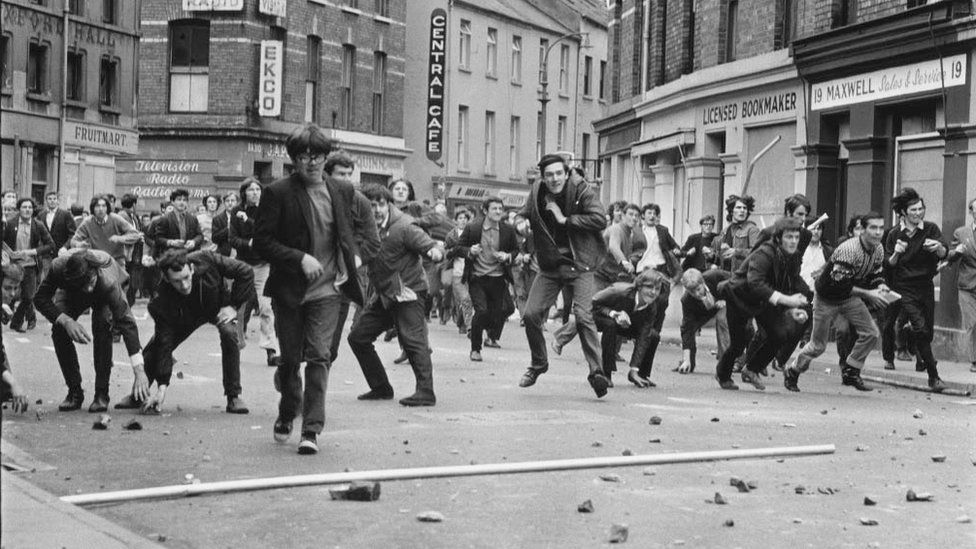22. THE LATER 1960s

THE WORLD GOES ON WITHOUT AMERICA

THE WORLD GOES ON WITHOUT AMERICA
 De Gaulle attempts to set France on an
De Gaulle attempts to set France on anindependent diplomatic course
 Adenauer tries to bring Germany back to
Adenauer tries to bring Germany back to
legitimacy in European affairs
 The British attempt to pull out of a sense
The British attempt to pull out of a sense
of national feebleness
 The changing of the guard in the Kremlin
The changing of the guard in the Kremlin
 The Arab-Israeli "Six-Day War" of June
The Arab-Israeli "Six-Day War" of June
1967
 The "Prague Spring" – January-August
The "Prague Spring" – January-August
1968
 Mao attempts to reignite China's spirit of
Mao attempts to reignite China's spirit of
"revolution"
 European students begin their own
European students begin their own
protest movements – Spring of 1968
 The overthrow of the Papandreou
The overthrow of the Papandreou
government ion Greece – April 1968
 Spain and Portugal remain under very
Spain and Portugal remain under very
conservative governments
 Violence between Catholics and
Violence between Catholics and
Protestants breaks out in Northern
Ireland
The textual material on this webpage is drawn directly from my work
America – The Covenant Nation © 2021, Volume Two, pages 194-203.
DE GAULLE ATTEMPTS TO SET FRANCE ON AN
INDEPENDENT DIPLOMATIC COURSE |
As President of the French 5th Republic it was a major aim of de Gaulle to restore hurt French national pride by setting the country on an independent diplomatic course independent of its allies America and Britain.
|
De Gaulle attempts to undercut American leadership in Europe.
De Gaulle attempts to undercut American leadership in Europe. Johnson was so completely caught up in the challenge of his war in Vietnam that diplomatic interests and issues elsewhere in the world tended to be pushed aside. This certainly was the case in Europe. And because of this grand American distraction caused by the Vietnam War, French President Charles de Gaulle saw a grand opportunity to finally pull Europe away from its dependency on American protection, and bring Europe under the more traditional lead of France, or, more precisely, under the leadership of de Gaulle himself. The personal ambitions of de Gaulle had provided a regular dose of annoyance to France's allies as far back as World War Two (but what egotistical generals had not themselves been a pain to deal with in an alliance that required close cooperation in order to defeat the Germans?) Certainly de Gaulle had been the loudest of the few French leaders who in 1940 had not decided simply to surrender to the Germans, hoping for the best deal possible under German occupation (sort of a reversal of the Versailles Treaty arrangement that followed World War One when Germany got placed under the direction of its former enemies). De Gaulle would have none of that. But he also did not have much to work with. The French army and navy had come under the authority of the Vichy Government, and so de Gaulle at first actually commanded very little. Yet his French voice would prove very useful to England and America when it was time to get the French "Resistance" fighters moving in support of the Allied offensive across France in pursuit of a retreating Nazi army in 1944. But the cost of letting de Gaulle take the lead (such as leading the victory parade through Paris, as if it had been de Gaulle's troops themselves that had liberated their own capital city) would prove to be great. Other French generals had actually been much more useful in coordinating French military efforts with the American and British allies. But the name "de Gaulle" was better known (the British had let him deliver encouraging broadcasts beamed weekly to France in the time period prior to the Allied invasion of France itself). And thus it was that de Gaulle came simply to see himself as the voice (and conscience) of France – all of France. As a devoted Catholic, de Gaulle was fervently anti-Communist, which also made him very useful to Roosevelt, who (along with Churchill) was quite concerned about how the large French Communist party, through its belated involvement in the French Resistance, might move to take control of France in all the confusion of 1944-45, and the potential post-war period. Personally, Roosevelt detested de Gaulle and kept him away from the big-power conferences (such as Teheran and Yalta) held among the "Big Three" of Roosevelt, Churchill and Stalin. This hurt de Gaulle's immense ego, so much so that he developed a very bitter attitude towards the Anglo-Saxons (Britain and America) that would remain with him for the rest of his life. And therein lay a big part of the problem that de Gaulle would bring to American-European relations. This would develop not only immediately after the war, but even more so during the 1960s when de Gaulle was French President, and on a huge anti-Anglo-Saxon political-cultural campaign. During the Truman and Eisenhower years, America had been not only highly supportive of but even rather insistent upon America's allies in Europe putting their nationalist differences aside and start working closely together, largely as a matter of defense against expansive Communism. Thus the NATO military alliance had been birthed in 1949. But the matter went well-beyond military strategy. Closer "economic integration" had been pushed by America, in making the dollar freely interchangeable with all European currencies, and then also in encouraging the integration of Europe's strategic industries of coal and steel production (the European Coal and Steel Community set up in 1952), and eventually the birthing of a more comprehensive economic integration through the European Economic Community (EEC) brought together in 1957 by way of the Treaty of Rome. De Gaulle himself had been involved in none of this "European integration" during its formative post-war years. But in coming to power as head of the new French 5th Republic in 1958, he found himself at the very center of this dynamic. But he was not wild about the European integration dynamic such as it was structured. He wanted to change it from a system of governing by bureaucratic centralization to one simply of diplomatic cooperation on the part of fully sovereign European nations, a community of nations that would exclude America – and "offshore" Britain as well. The primary target for de Gaulle's new diplomatic offensive was NATO. Despite the fact that NATO's European headquarters were located in France, de Gaulle saw NATO simply as an unwanted American intrusion into the affairs that belonged only to the Europeans themselves. Thus he took what he hoped would be the lead in withdrawing from NATO by pulling his French Mediterranean fleet from NATO direction in 1959. Then that same year he demanded that the Americans and the British remove all nuclear weapons from French soil, as he wanted Continental Europe to come under the protection of his own French nuclear "Force de Frappe." De Gaulle was just as busy on the diplomatic front, encouraging the Germans to join him in taking a road independent of America. But Konrad Adenauer, German Chancellor at the time (1949-1963), though certainly friendly with de Gaulle, had no intentions of pulling away from the only serious power, namely, American power, that kept the Russians from attempting to extend their grip into Western Germany. To Adenauer, France was not a serious alternative to America as a power patron. Then Britain finally changed its mind about not joining the European "Common Market" (EEC) and in 1963 finally applied for admission. Previously Britain had tried an alternative route to economic cooperation with various other European countries, but found that this was not working as well as the EEC's Common Market, and thus decided that it was time to join the EEC. But de Gaulle simply vetoed the British application, leaving an embarrassed Britain out in the economic cold. De Gaulle was finally getting his revenge against Britain for being excluded from the Big Power club during World War Two! Also in 1963, he withdrew the French naval fleet from NATO's vital North Atlantic command, hoping that other Atlantic members of NATO would follow his lead. None did. Then with Johnson in the White House, de Gaulle really ramped up his anti-Anglo-Saxon campaign – although with the crushing of Britain's European plans, his campaign at this point was purely an anti-American matter. Despite his own anti-Communist instincts, his desire to break from the diplomatic front led by America caused him in early 1964 to drop his support of Chiang's Nationalist government in Taiwan and instead offer full diplomatic recognition to Mao's Communist regime ruling (or, at this point, actually destroying) mainland China. He also made a personal visit to the Soviet Union that same year, in an attempt to restore a friendship that traditionally France and Russia had enjoyed. De Gaulle in fact refused to refer to the Soviet Union as anything other than "Russia," not only downplaying the ideological differences that separated East and West but also now posing France as a truly neutral country in the Cold War. Then that autumn de Gaulle visited Latin America, taunting America's southern neighbors for having allowed themselves to have fallen under U.S. economic and political domination. 1965 was another big year for de Gaulle. In February he announced that France would demand the exchange of its dollar reserves for America's gold reserves, hoping to create a dollar crisis that would bring down the American economy. But none of the other nations followed his lead, even when he made a huge show of things by sending the French navy to America to bring back the American gold reserves. That same year he pulled out of the American-led Southeast Asia Treaty Organization (SEATO) that had been formed to block the expansion of Communism throughout the region. But again, none of the other members followed his lead. But the big hit occurred in February of 1966 when de Gaulle ordered all foreign troops out of France, that is, troops of any of the NATO members, though most notably American troops stationed in France.1 He did not actually order the NATO civilian staff out of France, although everyone understood that this humiliation was probably coming soon and so the whole of NATO command simply left France, and relocated itself in Belgium just south of its capital city of Brussels. This would actually work awesomely well for the Belgians, helping Belgium get out of its persistent French-Dutch language dispute by now refocusing itself as the headquarters of a United Europe (the EEC was also headquartered there). Oddly enough, France officially remained part of the defense treaty that NATO was built on, and would even continue to cooperate with various NATO operations (finally returning officially to full NATO membership again in 2009). But de Gaulle believed that he had sent a very clear message to the world: France wanted to have nothing to do with Pax Americana (the great "American Peace"). Perhaps there was nothing that Johnson could have done to "fix" the de Gaulle problem. But in any case, no effort was attempted. However finally, in 1968, the French themselves got so tired of de Gaulle's imperious ways that they failed to bend under his threat of an immediate departure as their president if the French did not approve a referendum for a constitutional amendment he put before them, one giving him even more powers as French president. They did not approve his referendum, and, as promised, de Gaulle quit, fully expecting France to fall back into such a crisis that the French would have to call him back to power – but once again (as in 1958) under his own terms. But France ignored him, and indeed, continued quite nicely without him. And with him gone, Britain was finally able to gain membership in the European Common Market. And America and France could get back together as friends. 1American Secretary of State Dean Rusk sarcastically asked de Gaulle: did this order to evacuate all U.S. troops from France include the 50,000 American war dead buried in French cemeteries?
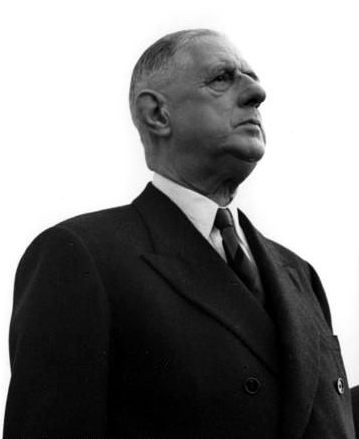
French President, Gen. Charles
De Gaulle – 1961 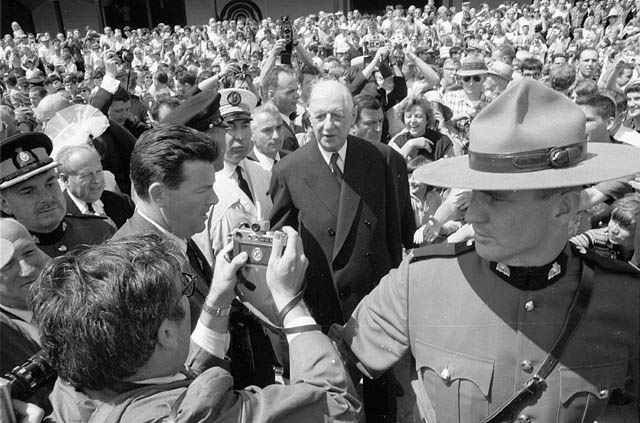
A day after his "Vive le
Québec Libre!" speech, Charles de Gaulle attracts a crowd at Montreal's
Expo 67 – July 25, 1967. He left Canada abruptly
two days after his call of "Free Quebec" infuriated English-speaking
Canadians (and embarrassed many French-speaking Canadians) for this was the call of
those who wanted Quebec to secede from Canada and become an independent
As rather perpetual Chancellor of the new post-war German Federal Republic, it was Konrad Adenauer's goal to get Germany past the Hitlerian shame ... and on to full, legitimate standing within the European community 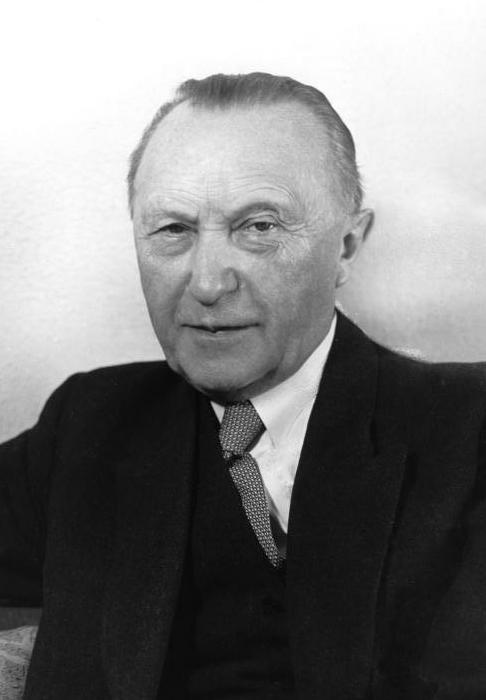
German Chancellor Dr. Konrad
Adenauer – 1951 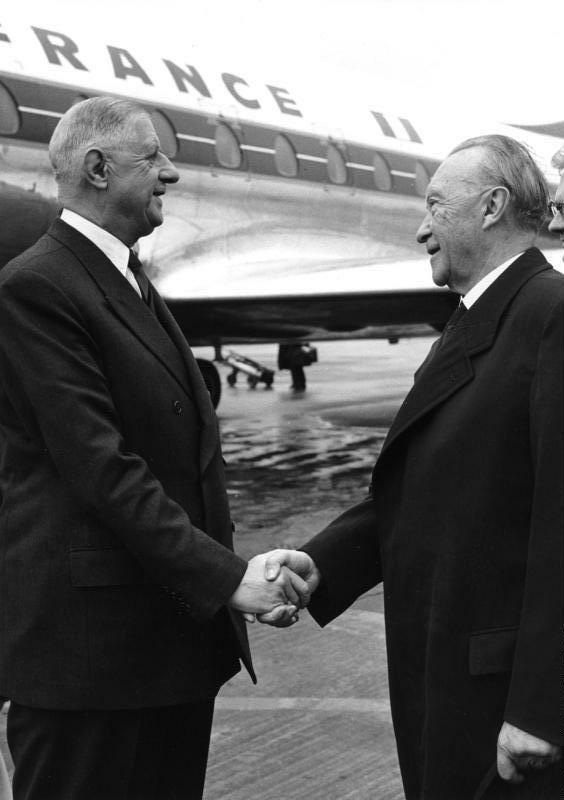
Humiliated by its embarrassing failure during the Suez Crisis, by the end of the British Empire as its colonies moved to independence, and by its inability to get its economy truly back up and running since the end of World War Two, the British stumbled forward ... not sure whether a further turn to the Left or a turn to the Right politically would get Britain moving forward again. 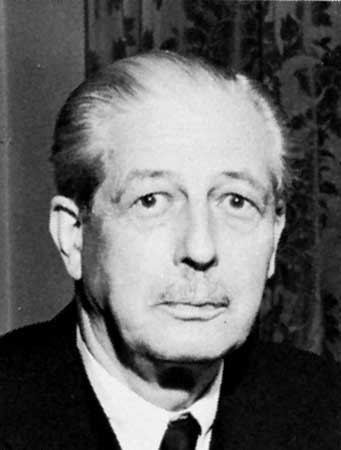 Harold Macmillan – Conservative
(Tory) Party leader and British Prime Minister (1957-1963) 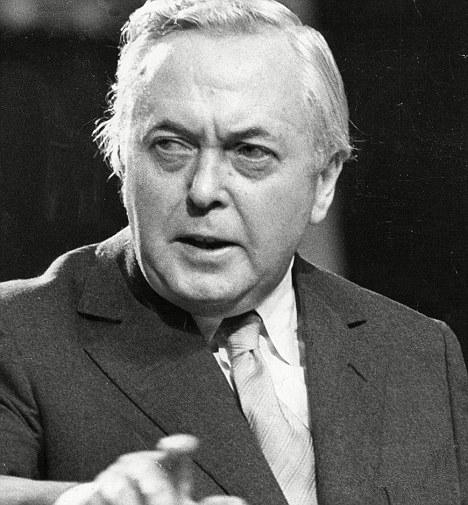
Harold Wilson – Labour Party
leader and British Prime Minister (1964-1970 and 1974-1976)
There's a changing of the Soviet Guard in 1964 as the Central Committee forces the resignation of Khrushchev who, especially after the fiasco of the Cuban missile crisis and some wild and unsuccessful experimenting with new agricultural policies, as by this time convinced enough members of the Central Committee that he is too capricious to continue to be entrusted with leadership of the Soviet Union. This brings Brezhnev and Kosygin to co-lead the Soviets. 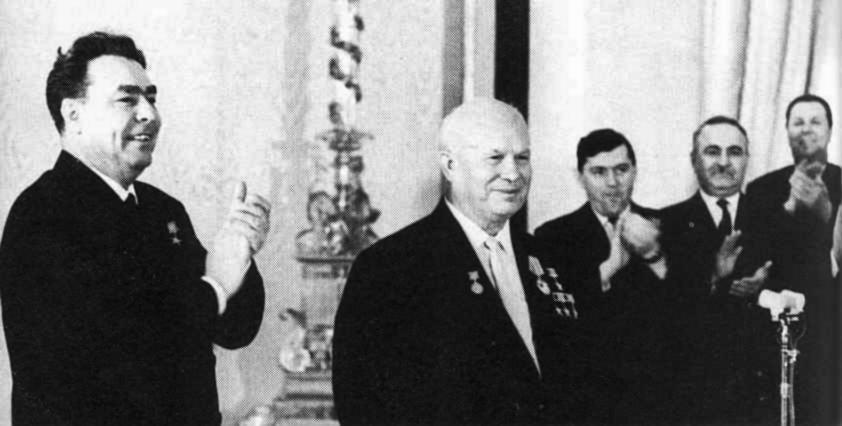
Leonid Brezhnev (left) celebrating Khrushchev's 70th birthday – April 1964 while secretly plotting Khrushchev's overthrow (in October his Party colleagues stripped him of all political positions, forcing him into retirement) 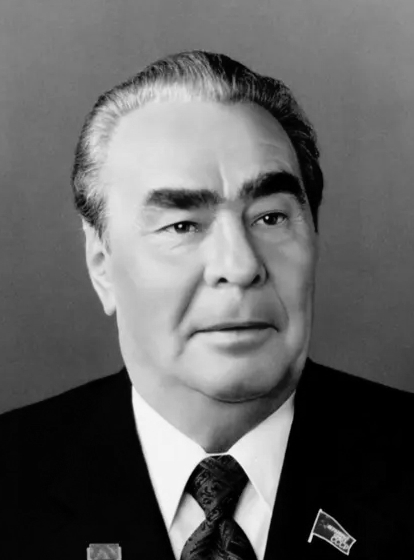
Leonid Brezhnev – Communist Party General Secretary (1964-1982) 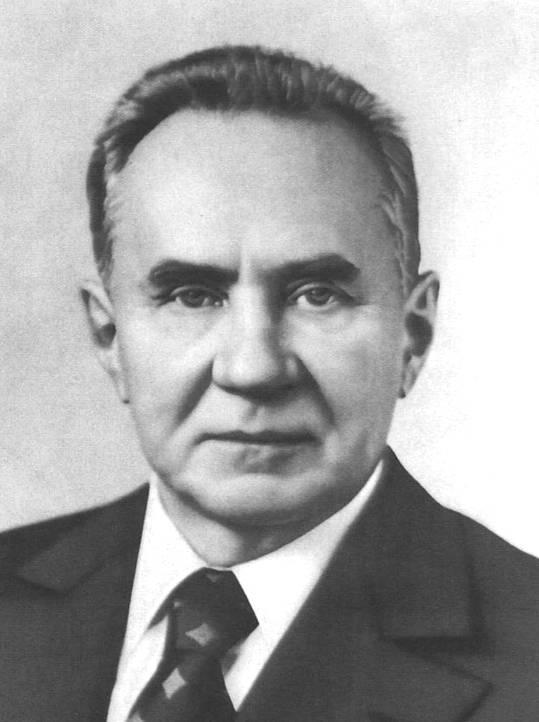
Alexei Kosygin – Soviet Government Premier (1964-1980)
who is playing the 'Israeli card' in order to swing a rising spirit of Arab nationalism under his authority
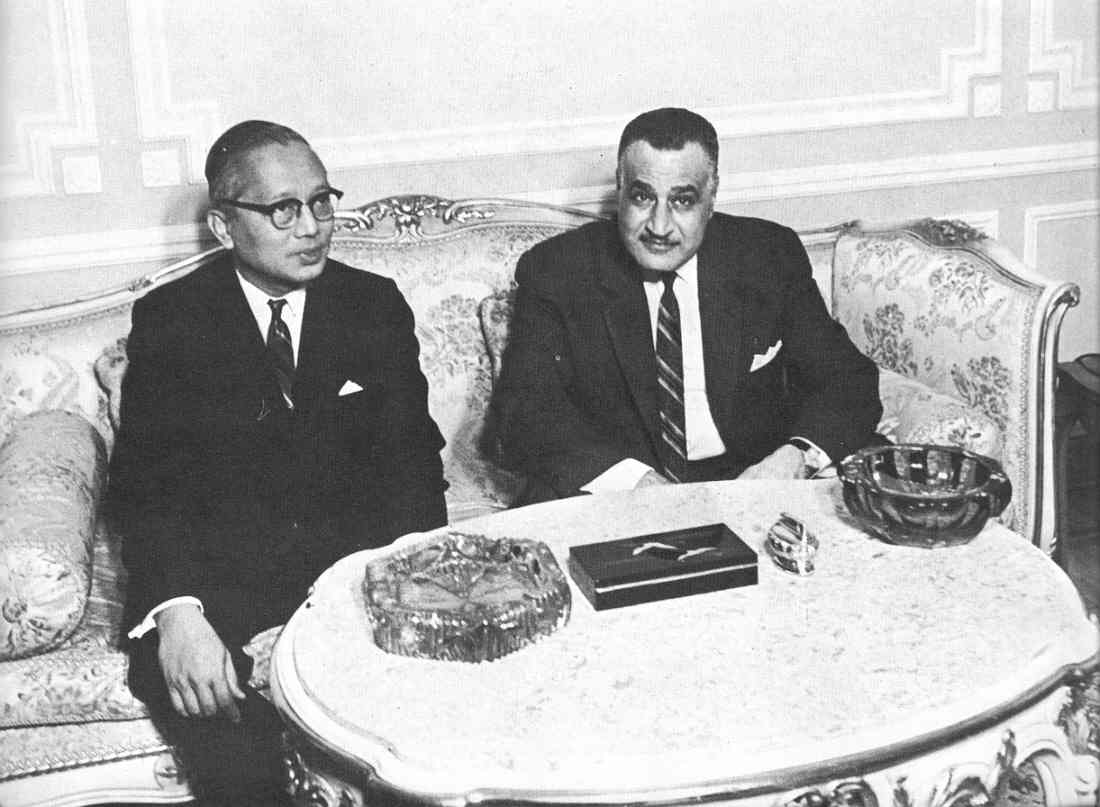
United Nations Secretary
General U Thant meeting with Egyptian President Gamel Abdul Nasser in late May 1967 to try to
back the Egyptians down from a growing confrontation with the
Israelis 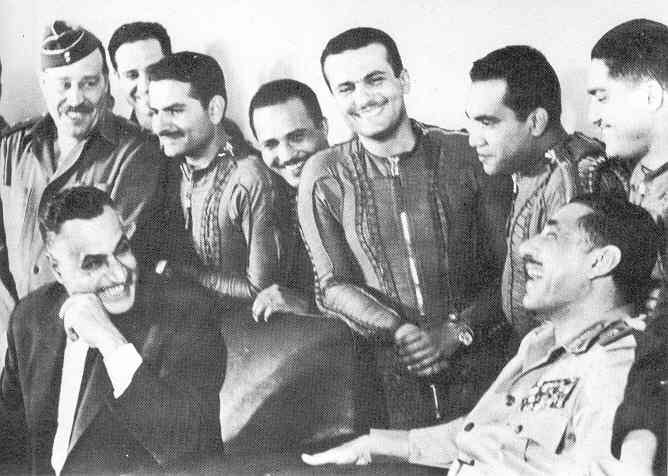
Egyptian President Gamel Abdul Nasser and Egyptian Abdel Hakim Amer enjoying shortly before the outbreak of the June war with Israel. After the Egyptian defeat, Amer was arrested for plotting to overthrew Nasser – and committed suicide. Israel strikes the first blow – 7:45 a.m., June 5, 1967
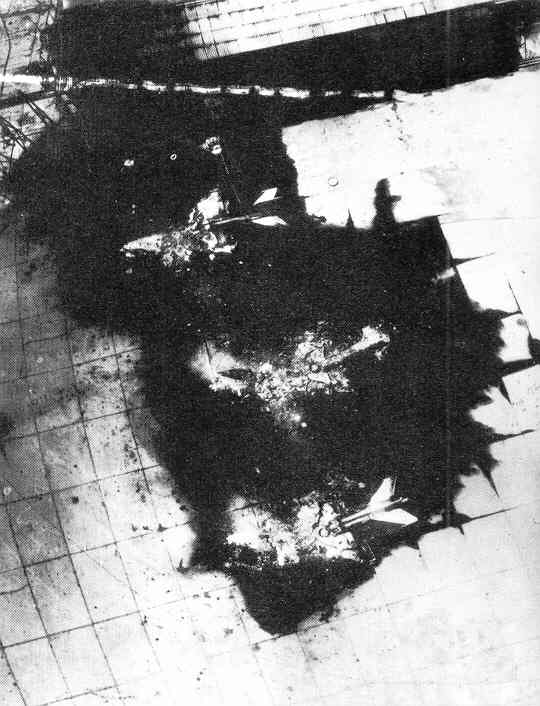
Part of the Egyptian air
force caught unprepared for an Israeli surprise attack – June 1967 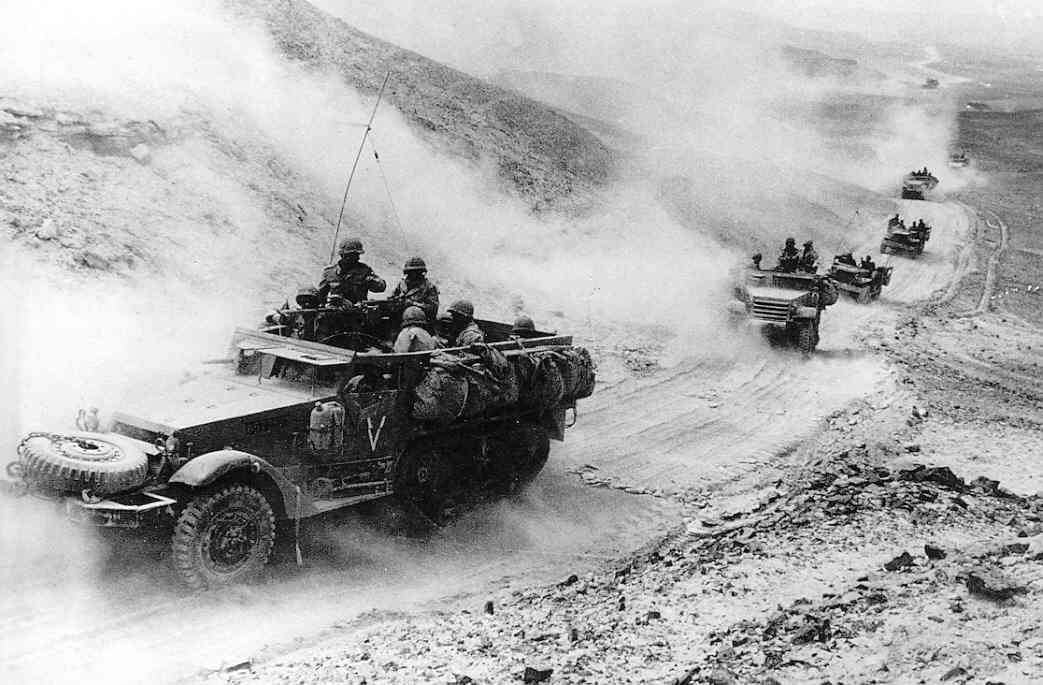 Israeli armored vehicles
advancing through the Sinai desert – June 1967 Israeli soldiers advancing
on Egyptian lines in the Sinai – June 1967 The United Nations Security
Council meeting on the Mid-east crisis – June 5, 1967 The burned-out remains of
Egyptian armored vehicles and tanks at the Mitla Pass – June 1967 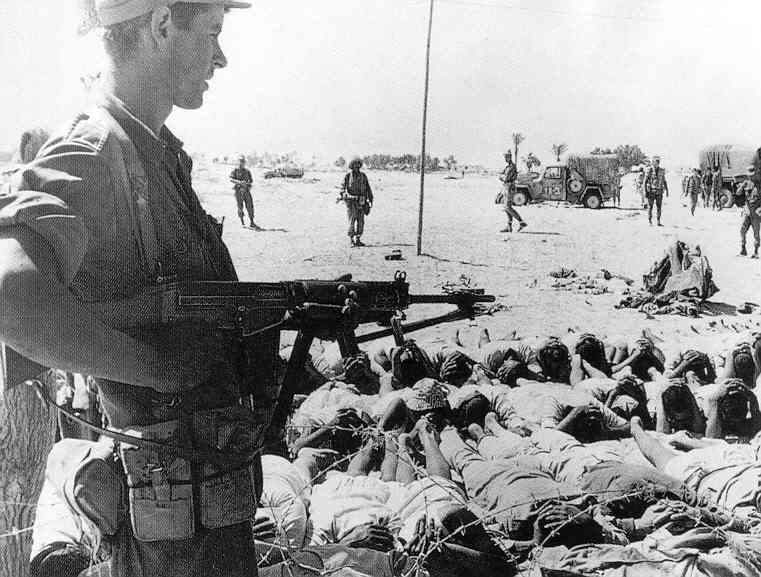
Israeli soldier guarding
Egyptian captives taken in the Gaza strip – June 1967 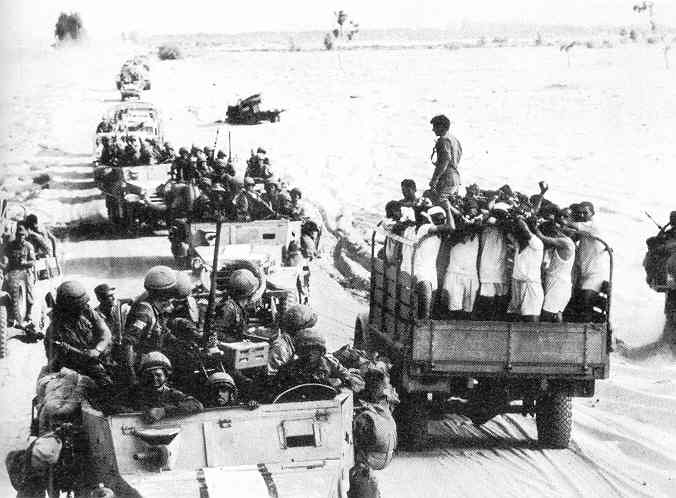
Israeli soldiers advancing
toward the front; Egyptian prisoners being brought to the rear 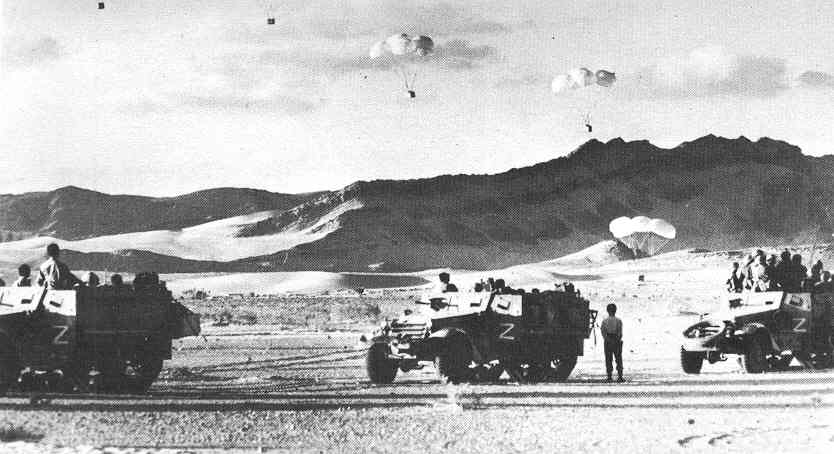
Supplies being dropped to
Israeli troops in the Sinai Desert on the third day of the war – June
1967 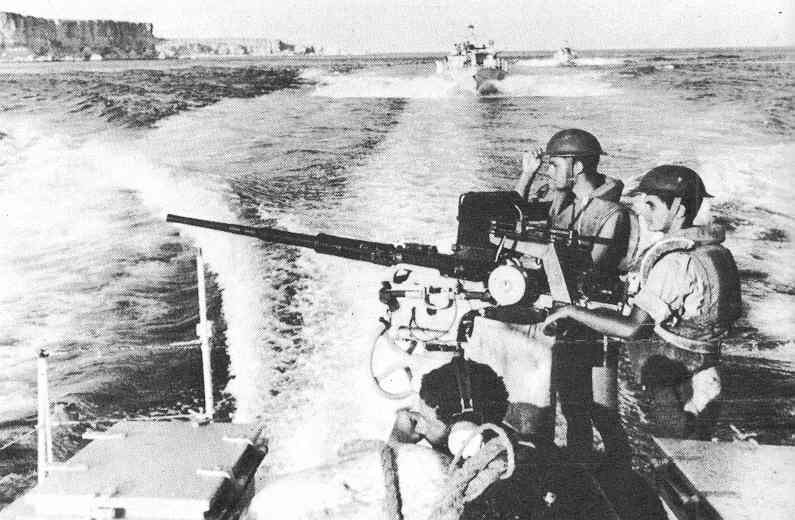
An Israeli torpedo boat patrolling
near the captured Sharm el Sheik fortress – ending the blockade of the
Israeli port of Aqaba 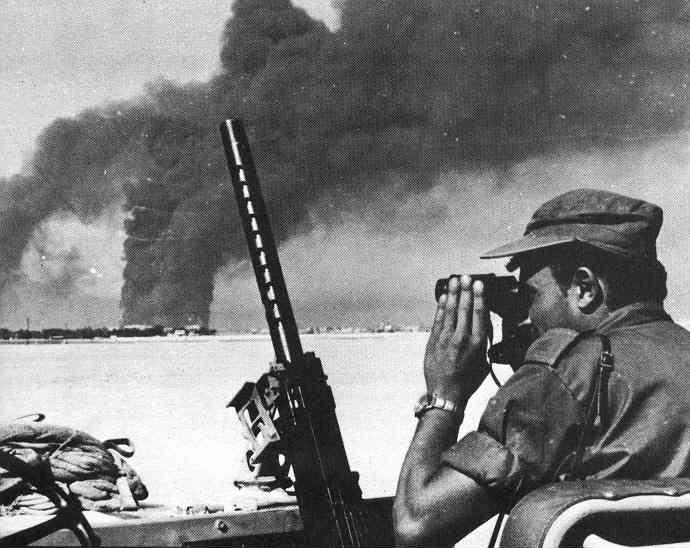
An Israeli soldier observing the burning of an Egyptian oil refinery across the Suez Canal Foolishly King Hussein of Jordan decided to make a show of support for Nasser. That was a huge mistake, the Israeli air force quickly destroying the Jordanian air force. Syria also jumped in against Israel, suffering the same quick destruction.
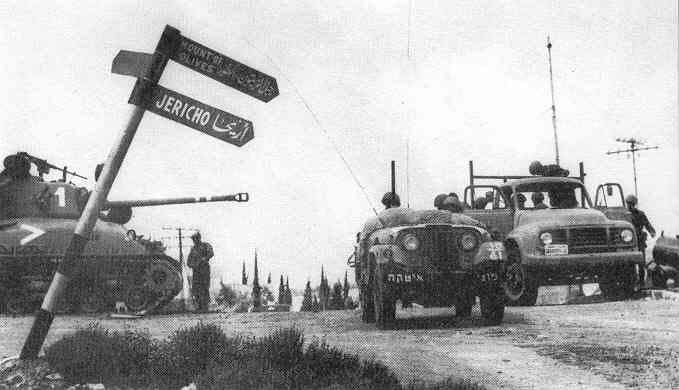
The Israelis sweep quickly
through the West Bank region
against the Jordanians – June 1967 Israeli soldiers planning
their moves into East Jerusalem – June 1967 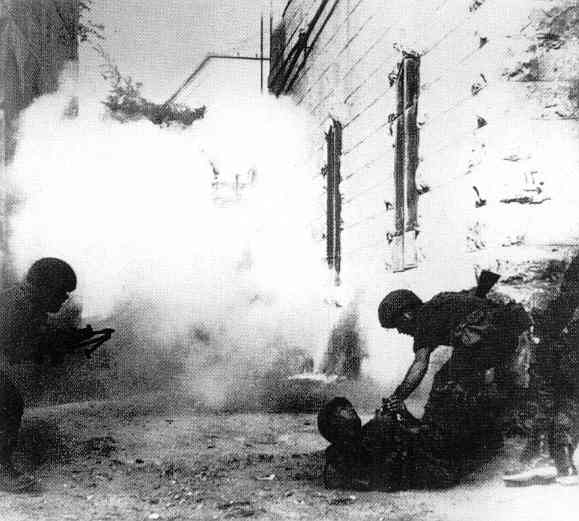
Israeli troops involved in
a street battle for East Jerusalem – June 1967 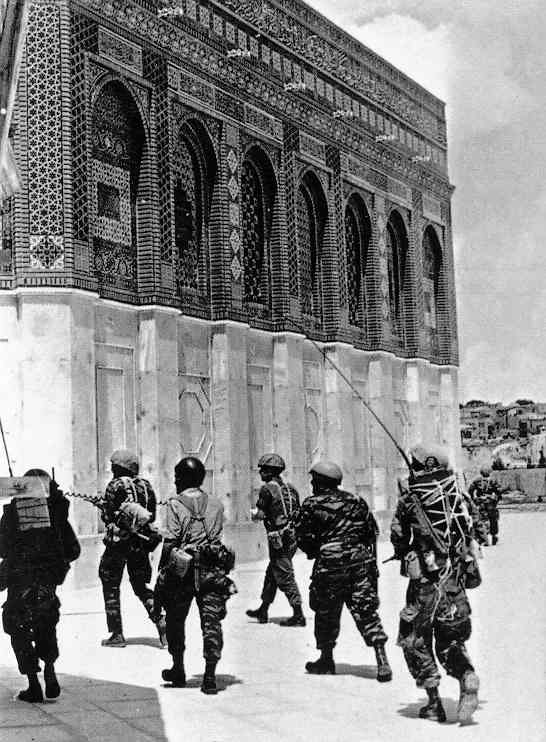
Israeli troops taking control of the
Al-Aqsa Mosque on the Temple
mount in Jerusalem The American monitoring ship
USS Liberty holed off the Egyptian coast by an Israeli torpedo
– an unexplained Israeli action
that caused 100 US casualties (the Israelis never
offered a convincing explanation for this attack on a well-marked American naval
vessel) Israeli troops celebrating
victory – June 1967 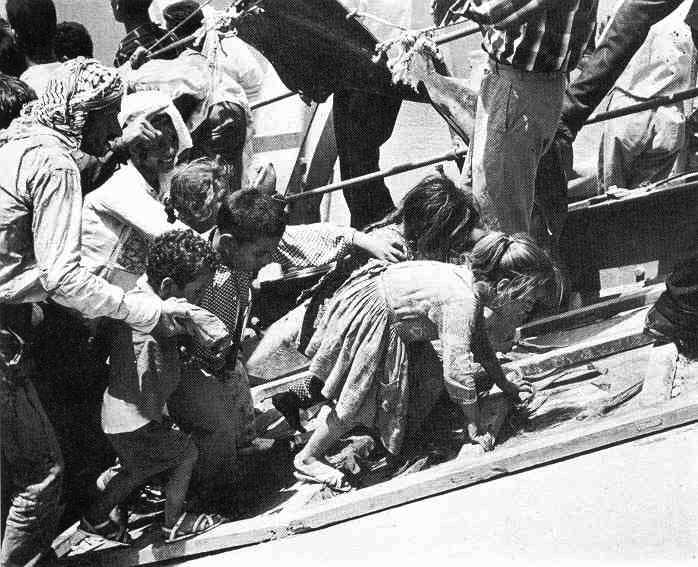
Palestinian refugees (some
of nearly 200,000) fleeing across a demolished Allenby bridge
into Jordan to escape the Israeli occupation
of the West Bank region United Nations observers at the Suez canal contemplating the consequences for world shipping of the blockage once again of the canal by ships scuttled at both ends (also trapping 15 ships within the canal) 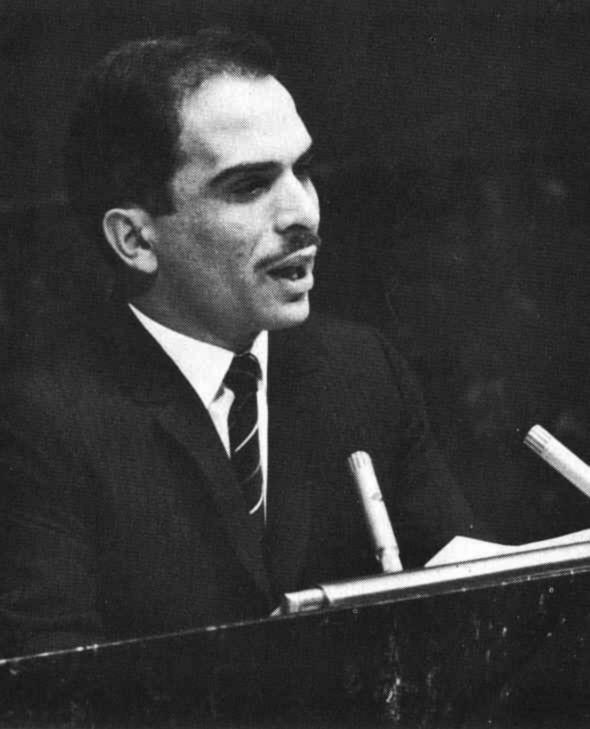 King
Hussein of Jordan at
the UN calls for withdrawal of Israeli forces from all captured territory
And the American nation (though
not yet its government) moves solidly
into the pro-Israeli camp thanks to a lot of pro-Israeli
media slant
Pro-Israeli protesters gather
in front of the White House – June 1967. Behind them is a much smaller
group of pro-Arab protesters 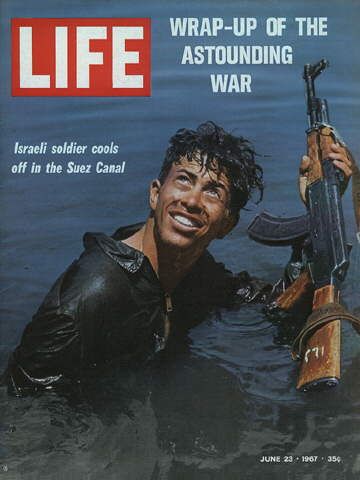 The American media followed
the war almost exclusively from the Israeli perspective ... drawing America broadly
into an on-going pro-Israeli position in the Arab-Israeli dispute. The Israeli occupation of
the Palestinian West Bank region will now be viewed in Israel
as the completion
of Israel's full unification.
The world (including the
U.S. government) however will not recognize these new boundaries …
and the Palestinians will continue
to struggle against this
expanded Israel in an rather futile effort to secure their own national
homeland Captured Russian-built Egyptian
tanks being paraded through a "unified" Jerusalem on Israel's 20th Anniversary – May 2, 1968 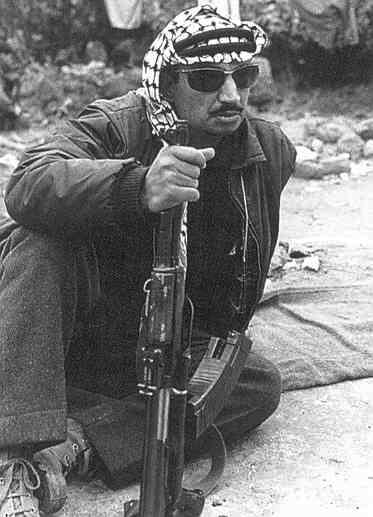
PLO chairman Yasir Arafat – 1968. He and his organization will be portrayed in the American media and popular culture as a war criminal for his actions in promoting and defending militarily the Palestinian cause
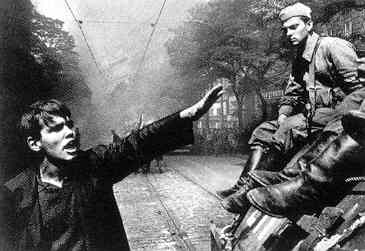
A Czech youth challenging
an invading Soviet tank crew The end of the "Prague Spring" – August 20-21, 1968 The forceful end of the "Prague
Spring" – August 21, 1968 Soviet tanks parked in the streets of Prague – 1968<
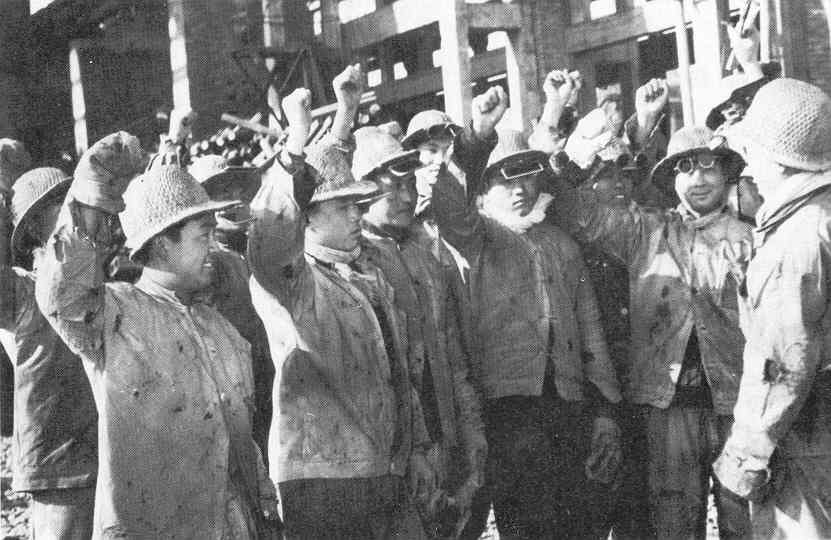 Chinese workers volunteering
to work unpaid overtime to surpass the British in steel production -
late
1950s 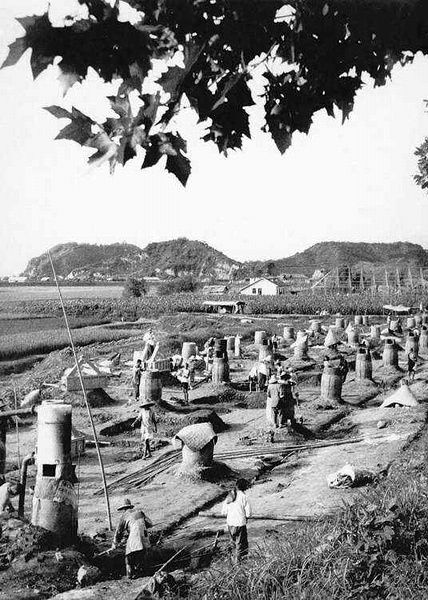
Backyard iron smelters created during the Great Leap Forward 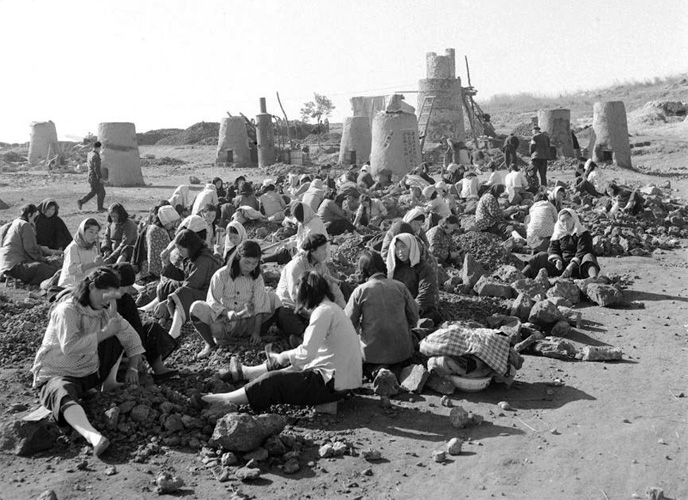
Chinese hard at work on their "back yard" smelters 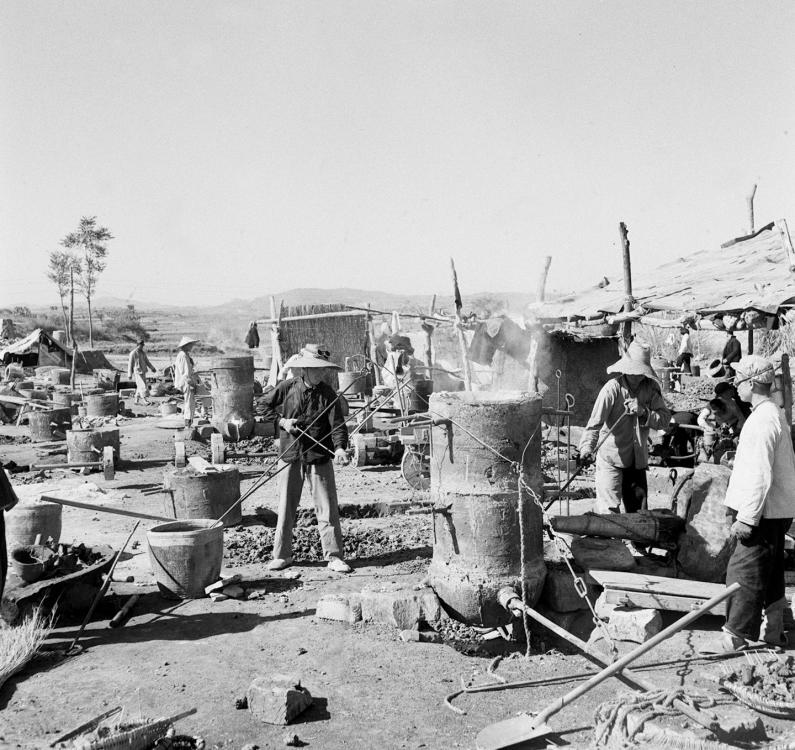
Chinese hard at work on their
"back yard" smelters
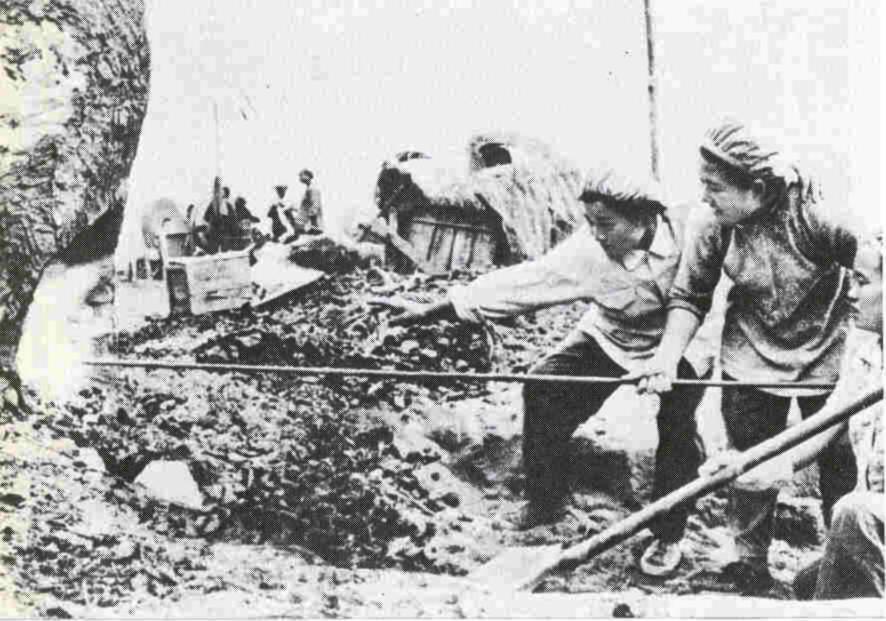
Chinese hard at work on their 'back yard' smelters 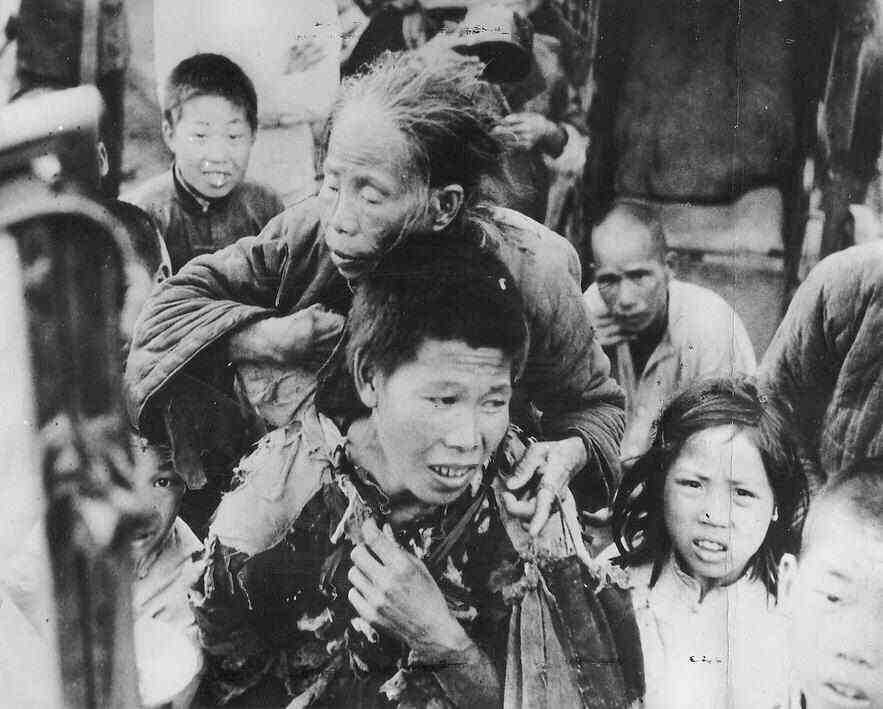
But by 1960 the problem of
hunger and mass starvation had become critical Mao tries again: The Chinese Cultural Revolution of the mid-late 1960s 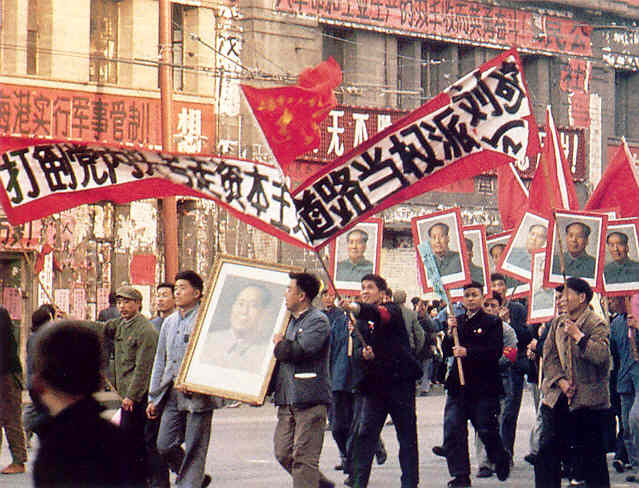
Chinese Red Guard – 1966 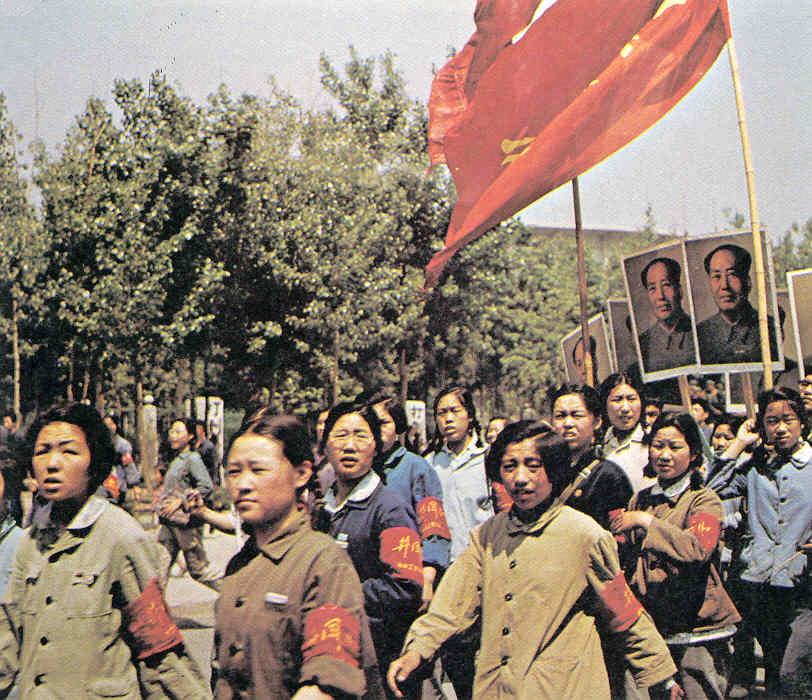
Youthful Chinese Red Guards – devoted followers of Chairman Mao Mao's Little Red Book – 1966 Thousands of the Chinese Red Guard gather to study Mao's Red Book 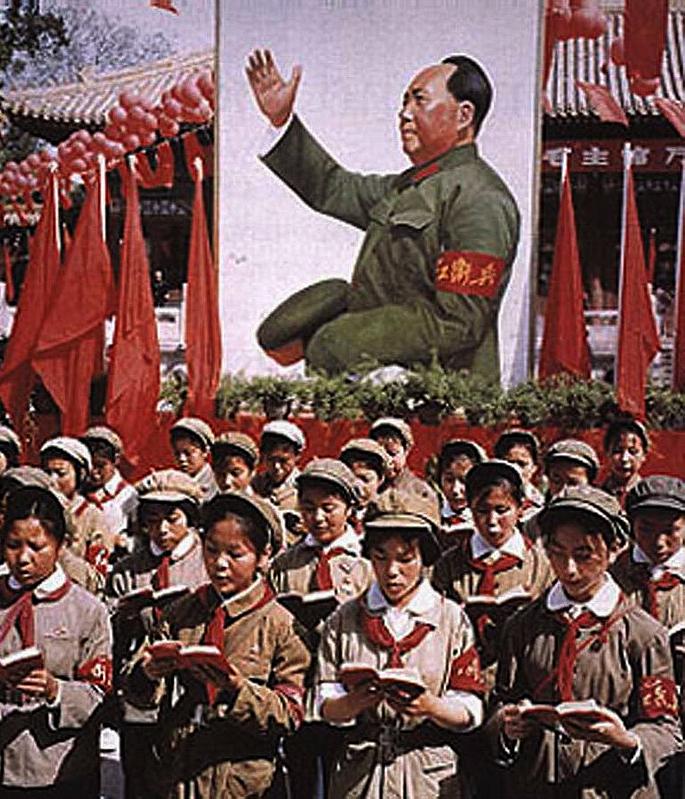
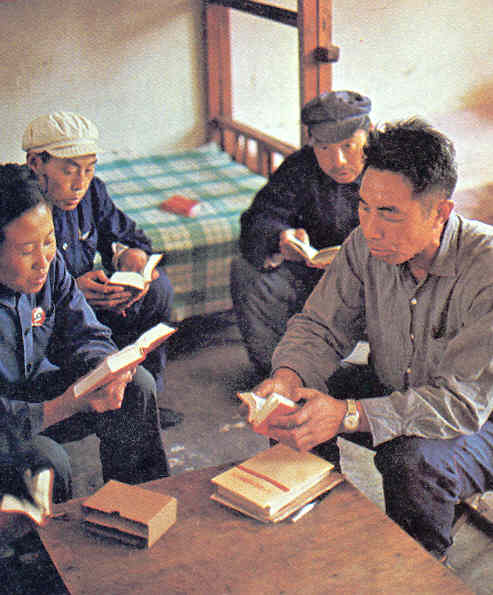
Studying Maoist
doctrine 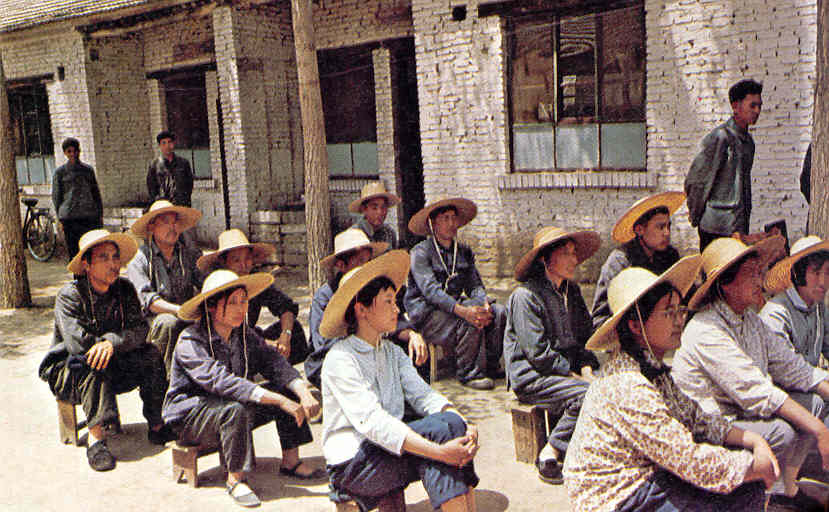
Maoist indoctrination 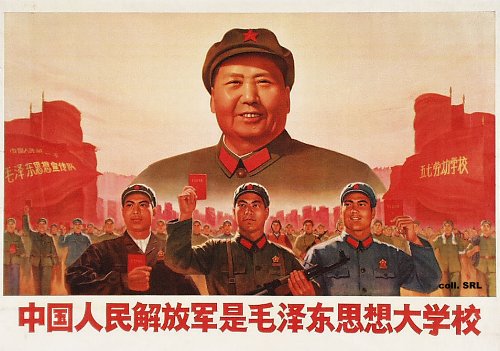
"The Chinese People's Liberation
Army is a University of Mao Zedong Thought" 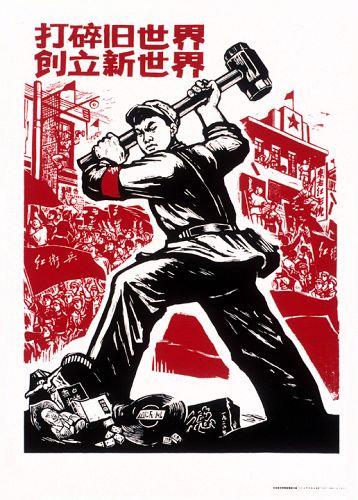
"We'll destroy old world
and build new." A young worker crushes the
crucifix, Buddha and classical Chinese texts with his hammer – 1966 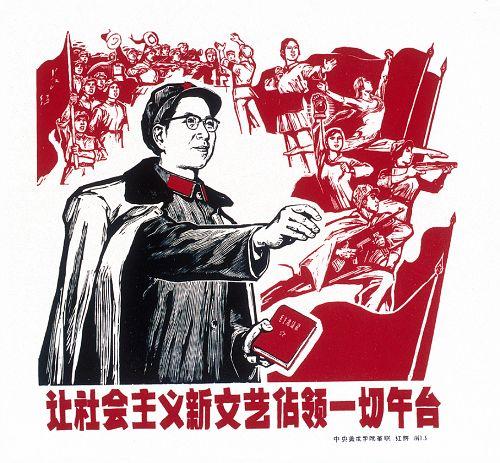
Mao's radically ideological
wife: Jiang Qing ... "Let new Socialistic culture conquer every stage" – 1967 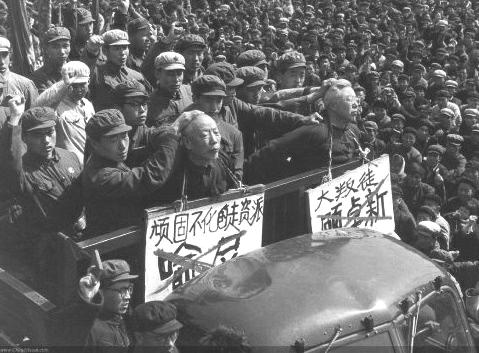
Two Chinese citizens branded as "Capitalist Roaders" and hence subjected to physical abuse in the public ... as part of the Maoist strategy of "Struggle Sessions" to get Chinese who were less than revolutionary to struggle with their "errors." Hundreds of thousands were required to do this in "reeducation" (prison) camps. Chinese youth conducting a “Struggle Session,” forced on an adult (probably teacher or local official) In some of the worst cases they would even be beaten to death by the overwrought youth 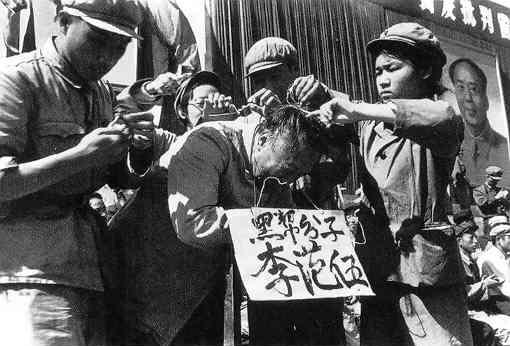
Young Maoists attacking an
older Chinaman who did not meet their measure
of proper Maoist demeanor – 1967 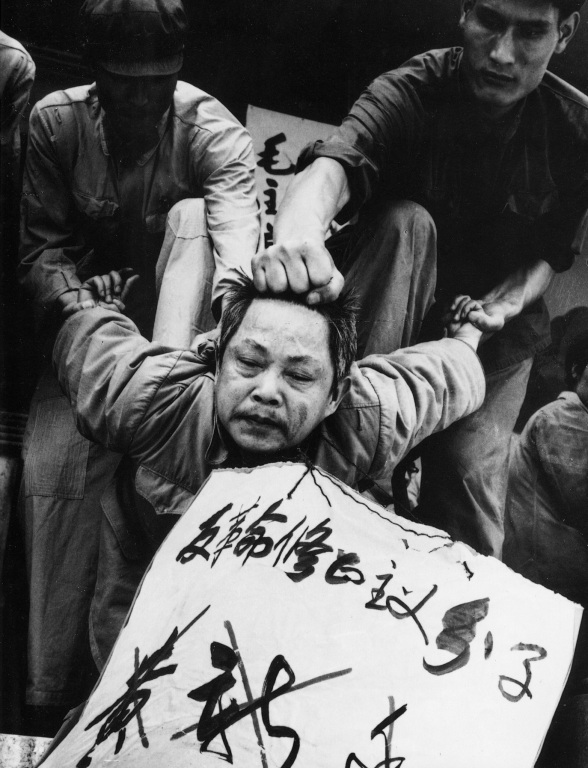
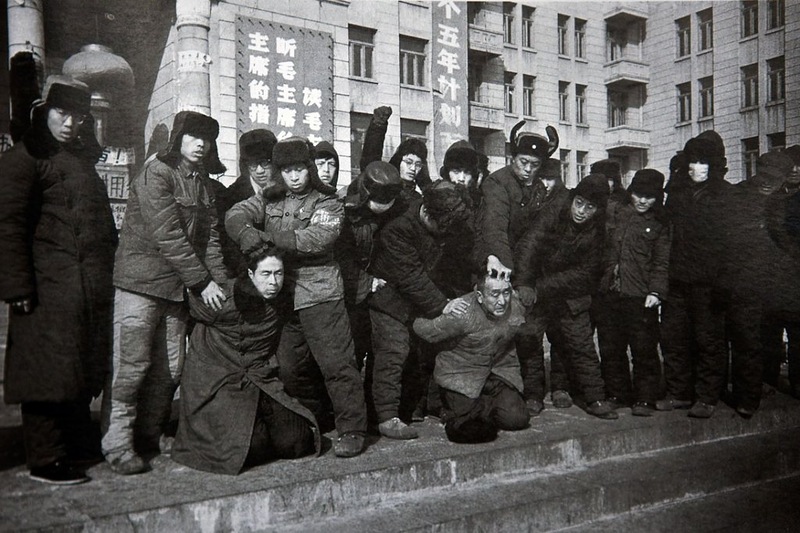
Chinese "Capitalist-Roaders" punished by Red Guards during the Cultural Revolution
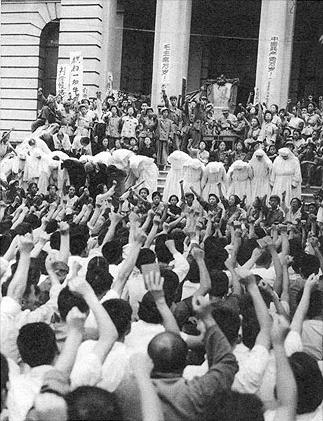
Red Guards denounce a group
of Franciscan nuns The nuns were expelled from China with great fanfare a few days later. These nuns had remained in China after the Communist victory in 1949. They ran an English school, which many children from Western embassies attended. During the Cultural Revolution their presence in China became evidence to the Red Guards that the revolution was not thorough enough. But the real goal of the
Cultural Revolution was to swing such strong public support behind Mao
that he could get rid of all his political adversaries
within the Communist Party (anyone with a personal base of support of his own
within the party) and thus rule China as he
personally chose to do so.
|
The Chinese Communist leader receiving the greatest focus of Mao's wrath was the party's next in command, Liu Shaoqi – also President of the People's Republic of China |
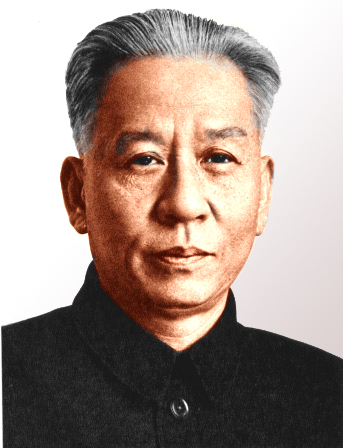
Liu Shaoqi – Chairman (President) of the People's Republic of China (1959-1968)
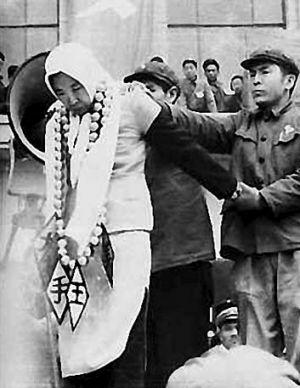
Persecution of Liu Shaoqi's wife, Wang Guangmei – 1967
EUROPEAN STUDENTS BEGIN A SERIES OF THEIR OWN PROTEST MOVEMENTS – SPRING OF 1968 |
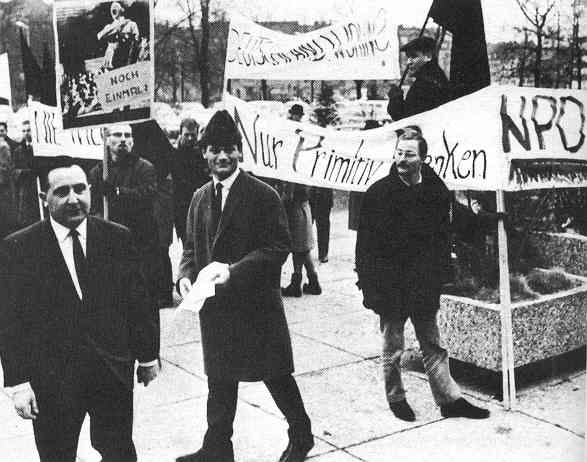
German university students
protesting a meeting in Nuremberg
of the neo-Nazi German Democratic
Party
Police clashing with students
protesting against the shooting of the left-wing student leader
Rudi Dutschke – mid-April 1968
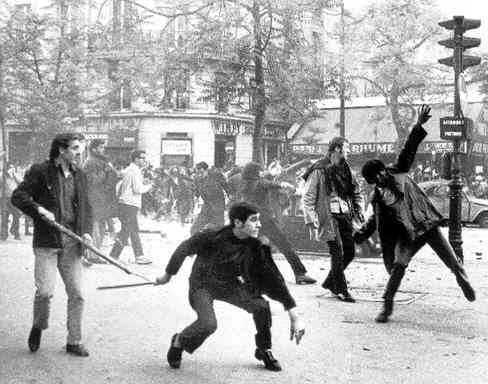
Paris police storming student
barricades in the Latin Quarter – May 1968
French President Charles de Gaulle at a press conference – 1968
He promised social reforms ... to meet some of the demands of the rioting youth. But ultimately his idea of "social reforms" was to increase his own power as French President.
THE OVERTHROW OF THE PAPANDREOU GOVERNMENT BY GREEK MILITARY LEADERS – APRIL 1968 |
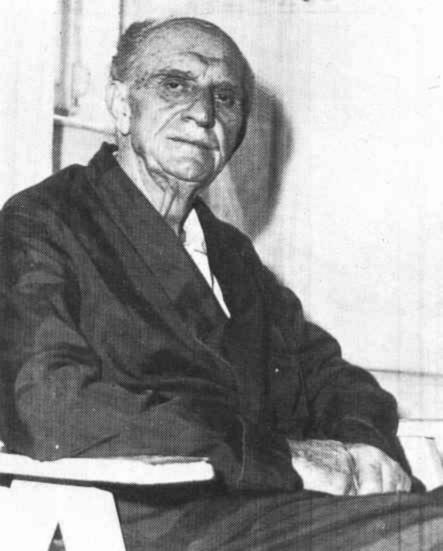
Greek Prime Minister George
Papandreou resting at a military hospital following a military coup
and his arrest by a right-wing junta in April 1968 (in which the US was adjudged
by many to be in complicity)
Greek King Constantine and
military leaders behind the coup which overthrew the Papandreou
government (the king later broke with
the junta ... but failed in an attempted countercoup)
SPAIN AND PORTUGAL REMAIN UNDER THE TIGHT CONTROL OF VERY CONSERVATIVE GOVERNMENTS |

Long-reigning Spanish Caudillo (dictator) 1936-1975
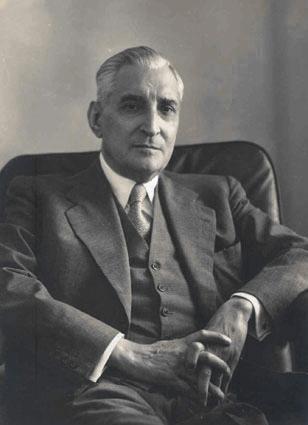
Antonio de Oliveira Salazar. Also long-reigning Prime Minister of Portugal (1932-1968) and ruler of the "New State" which controlled Portuguese politics from 1926 ... to when it was finally overthrown in 1974
VIOLENCE BETWEEN CATHOLICS AND PROTESTANTS BREAKS OUT IN NORTHERN IRELAND – AUGUST 1969 |
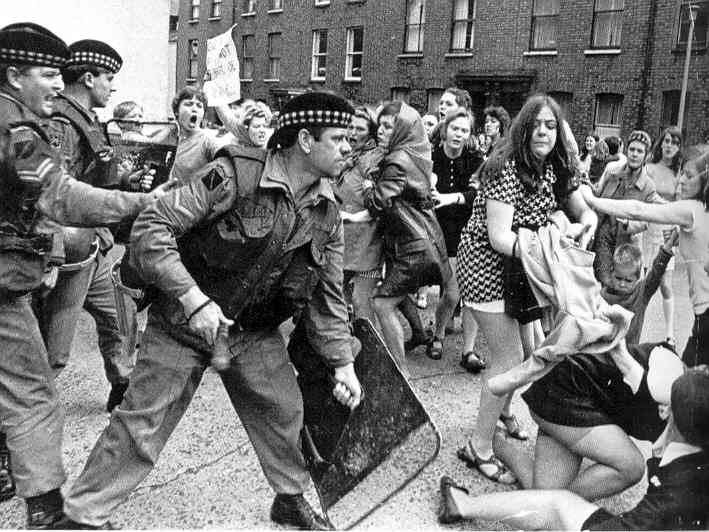
British peacekeeping troops being drawn into the Catholic-Protestant conflict in Northern Ireland – 1969
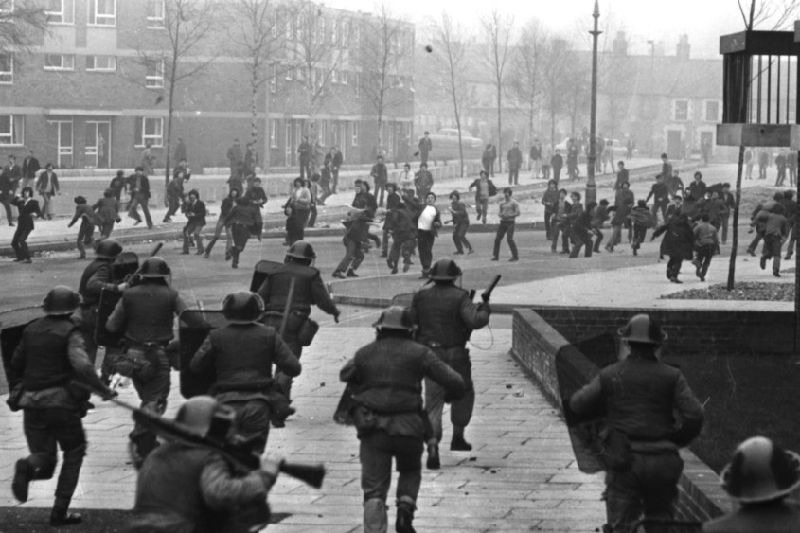
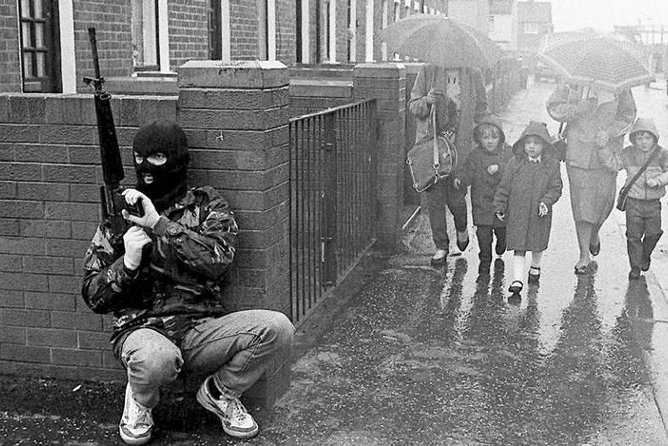
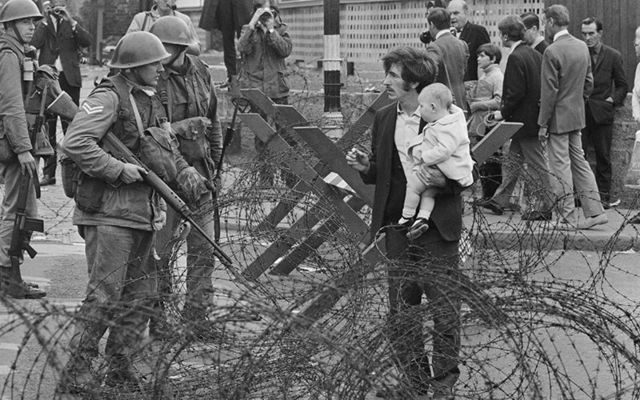

Go on to the next section: The Boomer Comes of Age


Go on to the next section: The Boomer Comes of Age


